FALL 2022




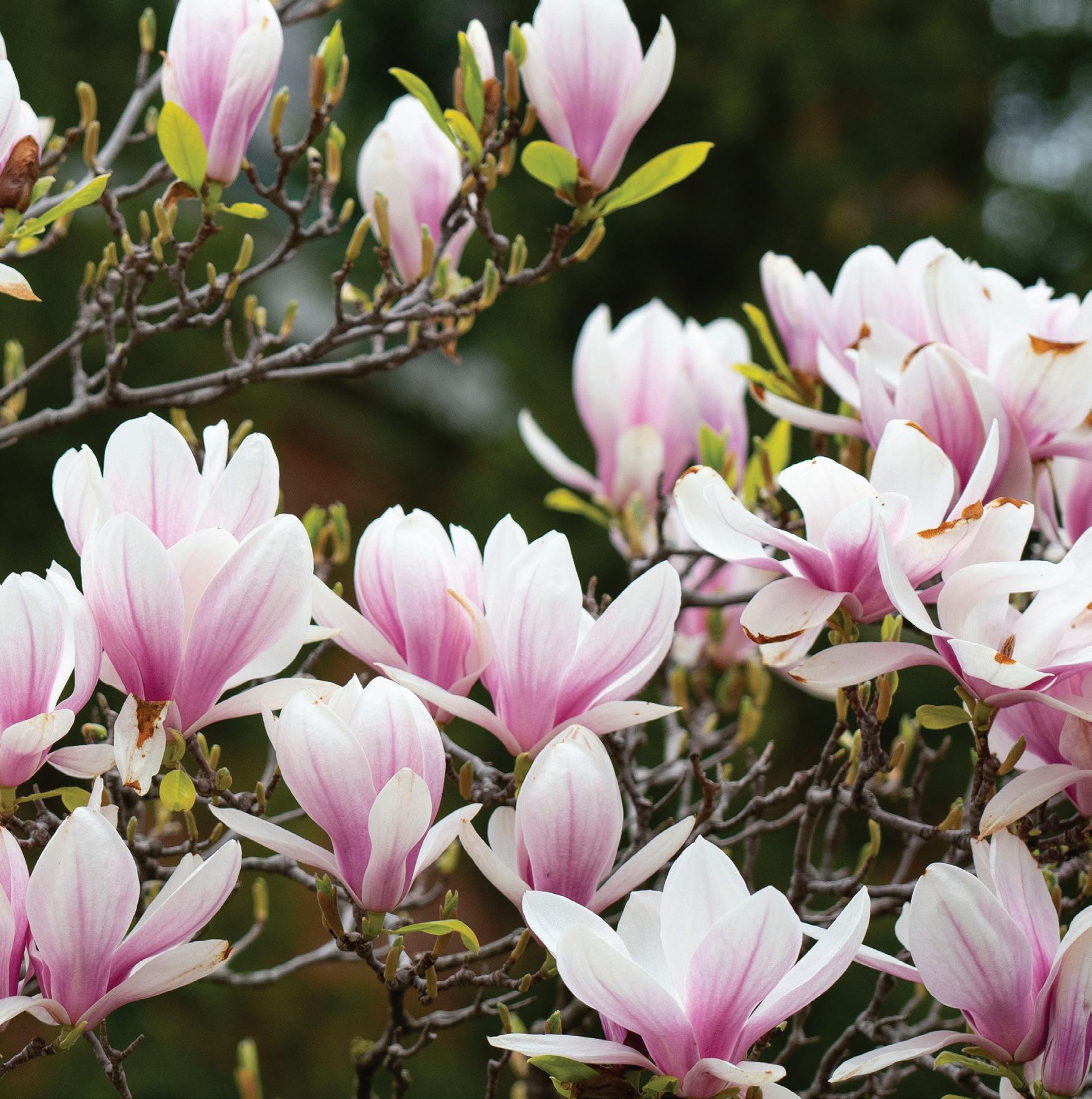














Greetings from Ridley! Welcome to the Fall 2022 edition of the Tiger—the publication that celebrates campus life and student accomplishment throughout the school year.
After two years of uncertainty, our record cohort of 711 students in 2021–2022—as well as our faculty, staff, alumni, and families—enjoyed a near-full return to inperson activity this spring. Not only did this term see the resumption of many of our most cherished traditions, but it also provided us with the opportunity to make up for lost time. Following the spectacular celebration of the Class of 2022, we were delighted to welcome the Class of 2020 and Class of 2021 back to campus in June to celebrate their outstanding achievements in person and to recover in full the experiences and beloved traditions that were placed on hold or otherwise diminished by the pandemic.
A thematic thread that ties this edition together is the concept of ‘breaking ground.’ As you will read, we continued to break ground both inside and outside of the classroom this term, charging headfirst into our 133rd year and celebrating several academic, artistic, and athletic milestones along the way. With COVID-19 firmly in our rear-view, the year of Courage has almost poetically given way to the year of Belonging, which will serve as our theme and singular focus in the 2022–2023 academic year. In March, we made tremendous strides in our belonging-work as we welcomed Professor Irshad Manji, our first Global Leader in Residence, back to campus to continue our Moral Courage education (Page 22). In the coming year, we will continue to work with Professor Manji to equip ourselves with the tools to develop relationships across divides and hear, not fear, different perspectives. The spring also saw a fulsome return to tradition with the return of Cadet Mess Dinner (Page 29) and Cadet Day (Page 28), Arts in April (Page 24) and the return of in-person athletic competition, a highlight of which was the return of the Ontario Ergometer Championships to Ridley in March (Page 26). Read more about the inspiring accomplishments of our student-athletes and the awards and accolades they captured on Pages 26 and 27.
On March 7th, 2022, we broke ground on the Iggulden Building and Athletic Complex renovations, officially commencing The Campaign for Ridley—the largest and most ambitious construction project in our 133-year history. After four years of fundraising for The Campaign for Ridley, we are thrilled to announce that we have now entered Phase 1 of the Campus Master Plan. We are so excited to embark on this exciting new chapter in our history, building on our impressive legacy to reshape the learning landscape for future generations of young Ridleians and uphold our place as a global leader in education. We have made tremendous strides in the construction process already this year, and we look forward to making use of these new spaces upon their completion in Winter 2023. On this topic, alumnus Tim Griffin ’68 shares his thoughts on our new state-of-the-art Jack Aylott Squash Centre and the history of squash at Ridley, along with some incredible renderings on Page 36.
Rounding out the issue, our Alumni@Work series features the stories of inspiring Ridleians who have provided innovation and leadership in their respective industries (Page 50). Finally, this issue’s Archives Corner piece reflects on the rich history of boxing at Ridley College, charting the rise and fall of the sport at our School and memorializing this vibrant, endlessly fascinating episode in our 133-year history (Page 56).
While this year saw a number of highs and lows, we have much to look forward to in the coming months and years. With record enrollment in our 2022–2023 year, beautiful blue skies and mild autumn weather, it is clear that our optimism has not been unfounded. Once again, as always, we remain hopeful for what the future holds.
Terar Dum Prosim, J. Edward Kidd Headmaster
The vibrancy that has characterized Ridley College for 133 years was fully palpable this spring, as students, faculty, staff, and alumni gathered excitedly on campus to celebrate creativity and tradition, build meaningful connections, share unforgettable experiences, and cultivate a sense of belonging.

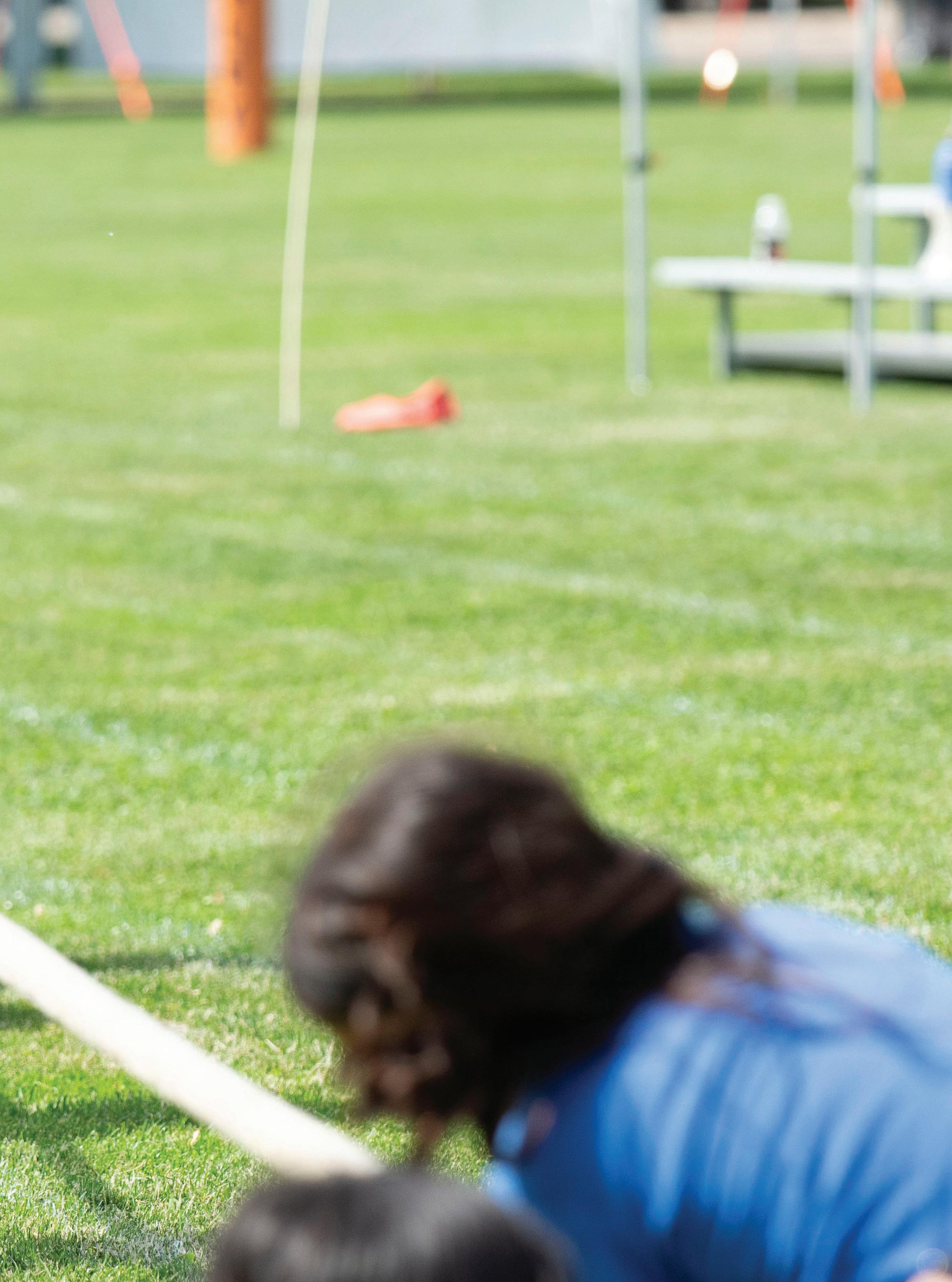 Southern Flame and Northern Ice go head-to-head in a game of tug-of-war during Lower School Sports Day.
Southern Flame and Northern Ice go head-to-head in a game of tug-of-war during Lower School Sports Day.
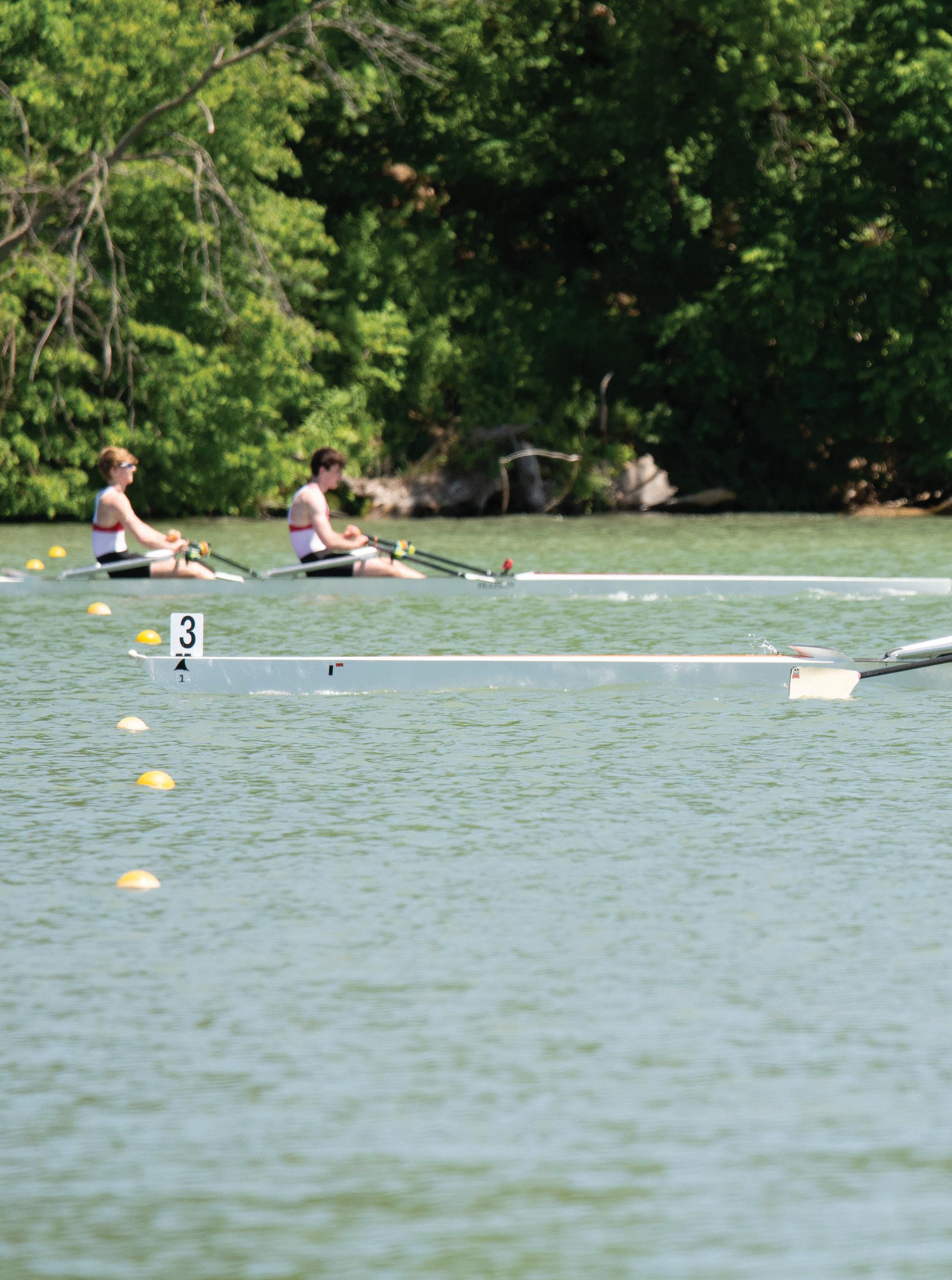 Ridley rowers compete in the 75th annual CSSRA races at Henley Island.
Ridley rowers compete in the 75th annual CSSRA races at Henley Island.

Drum Sergeant Major, Nathan Mandigo '22, carries on tradition by successfully tossing the mace over the Marriott Gates at the annual Cadet Parade.
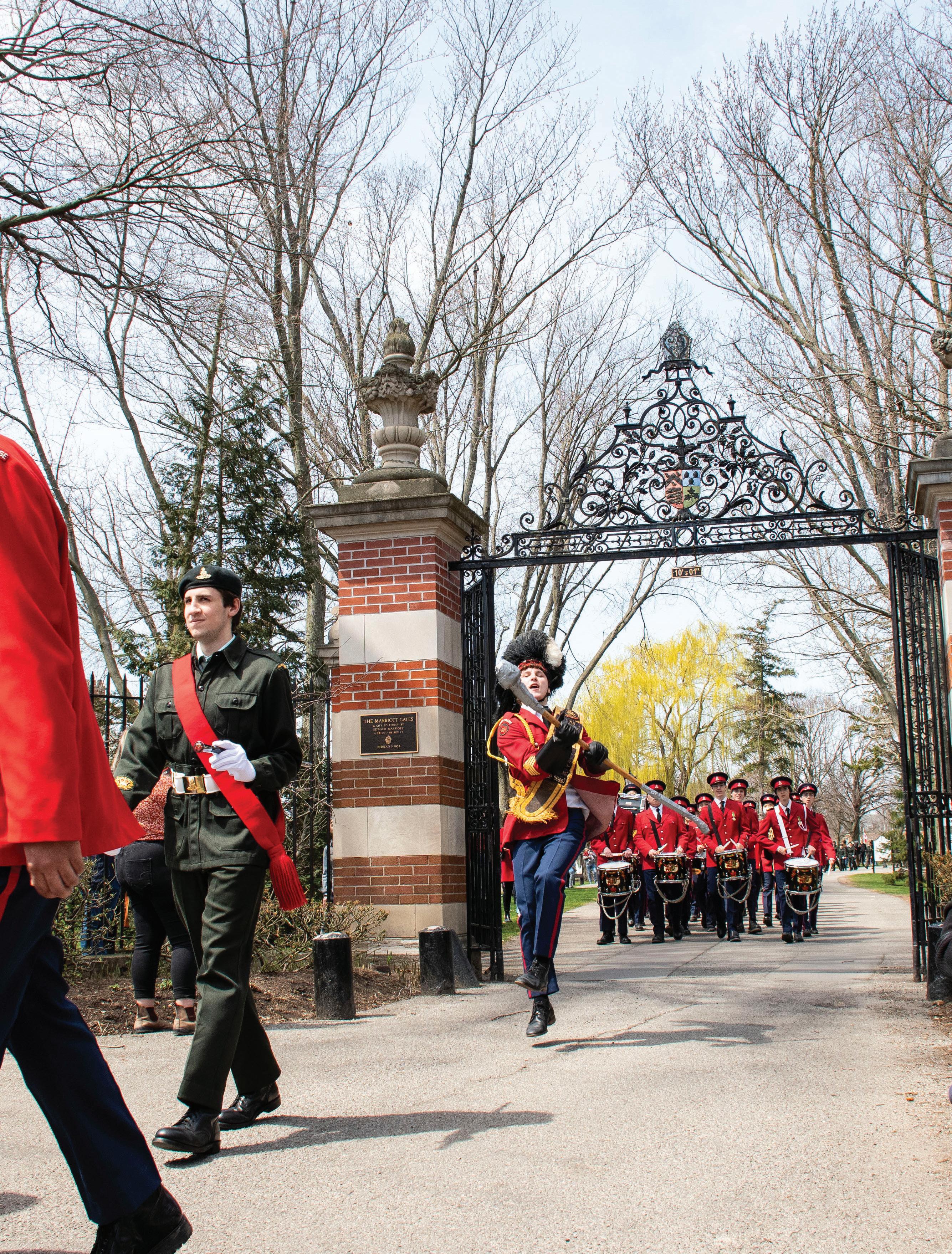

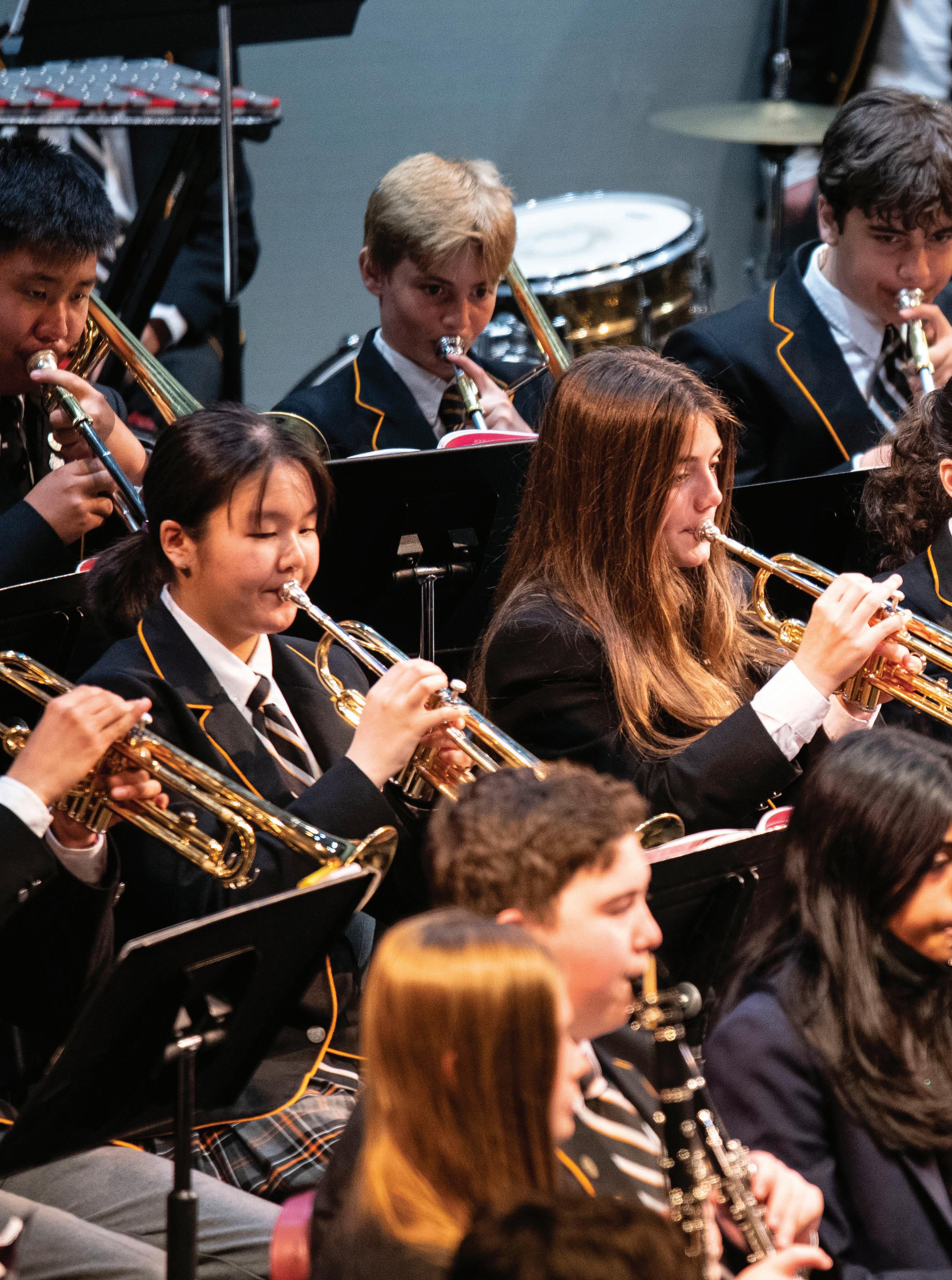
Students from Grades 7—8 perform on the Mandeville Theatre stage during the Lower School Music Concert.
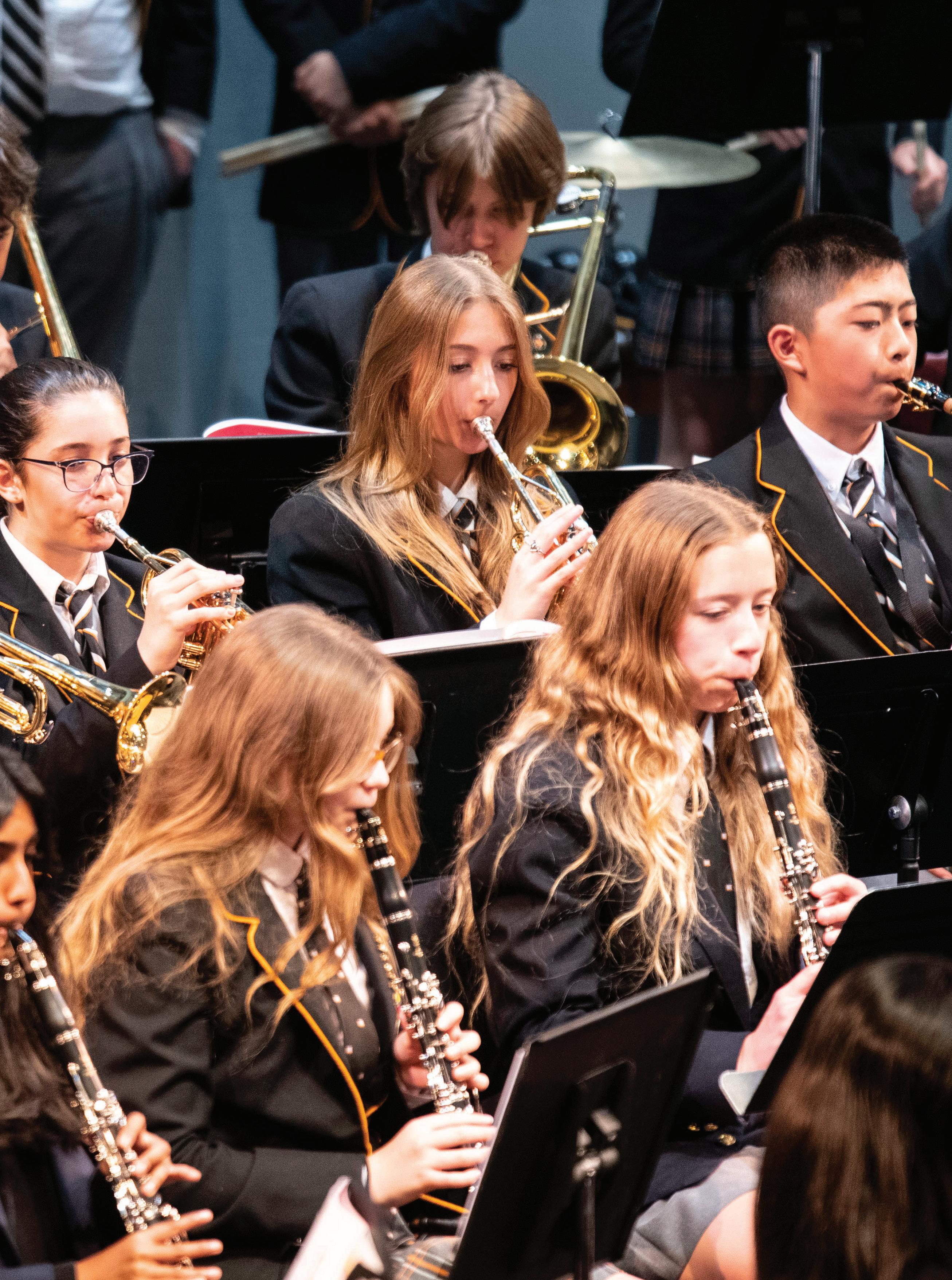
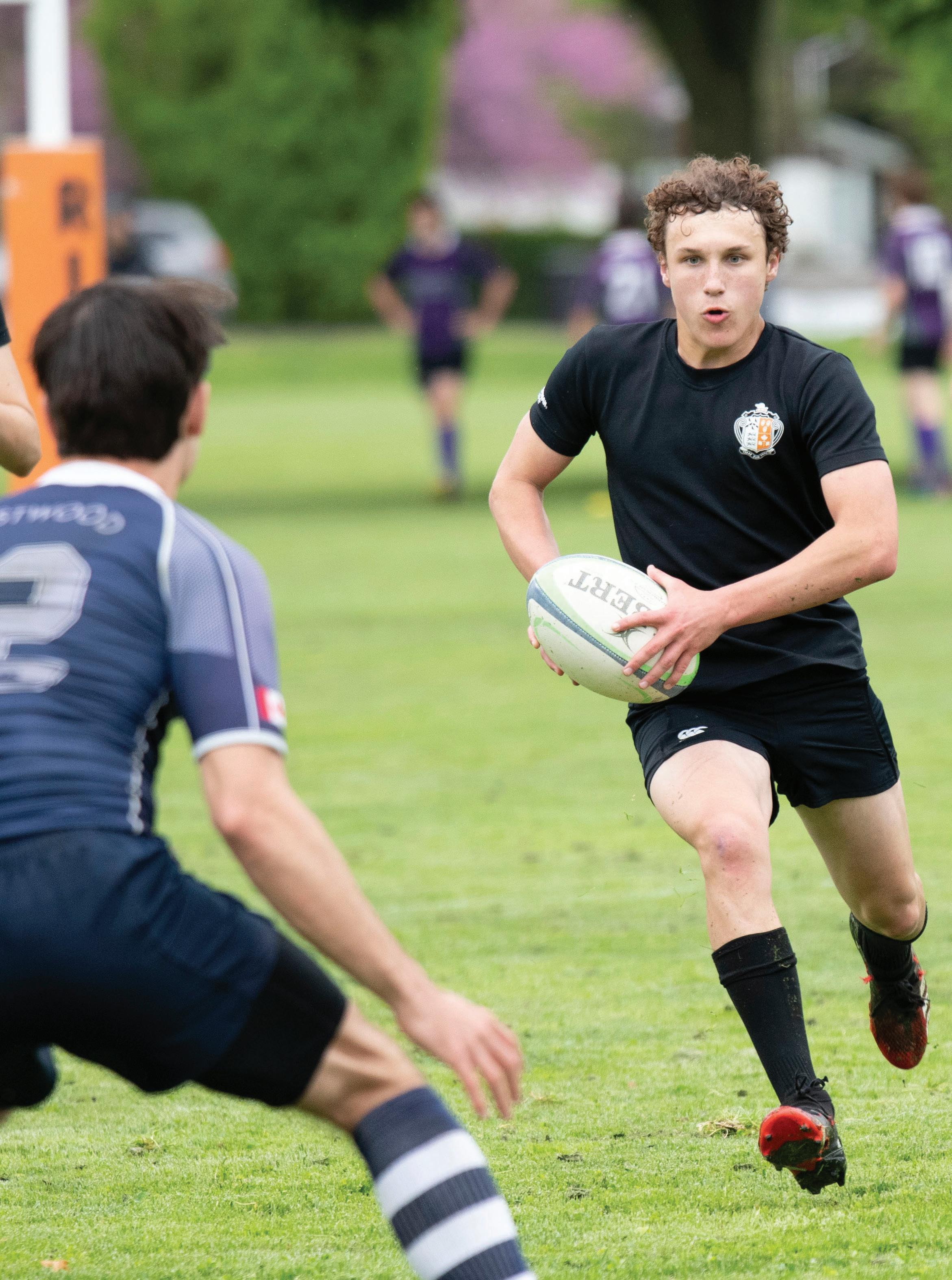
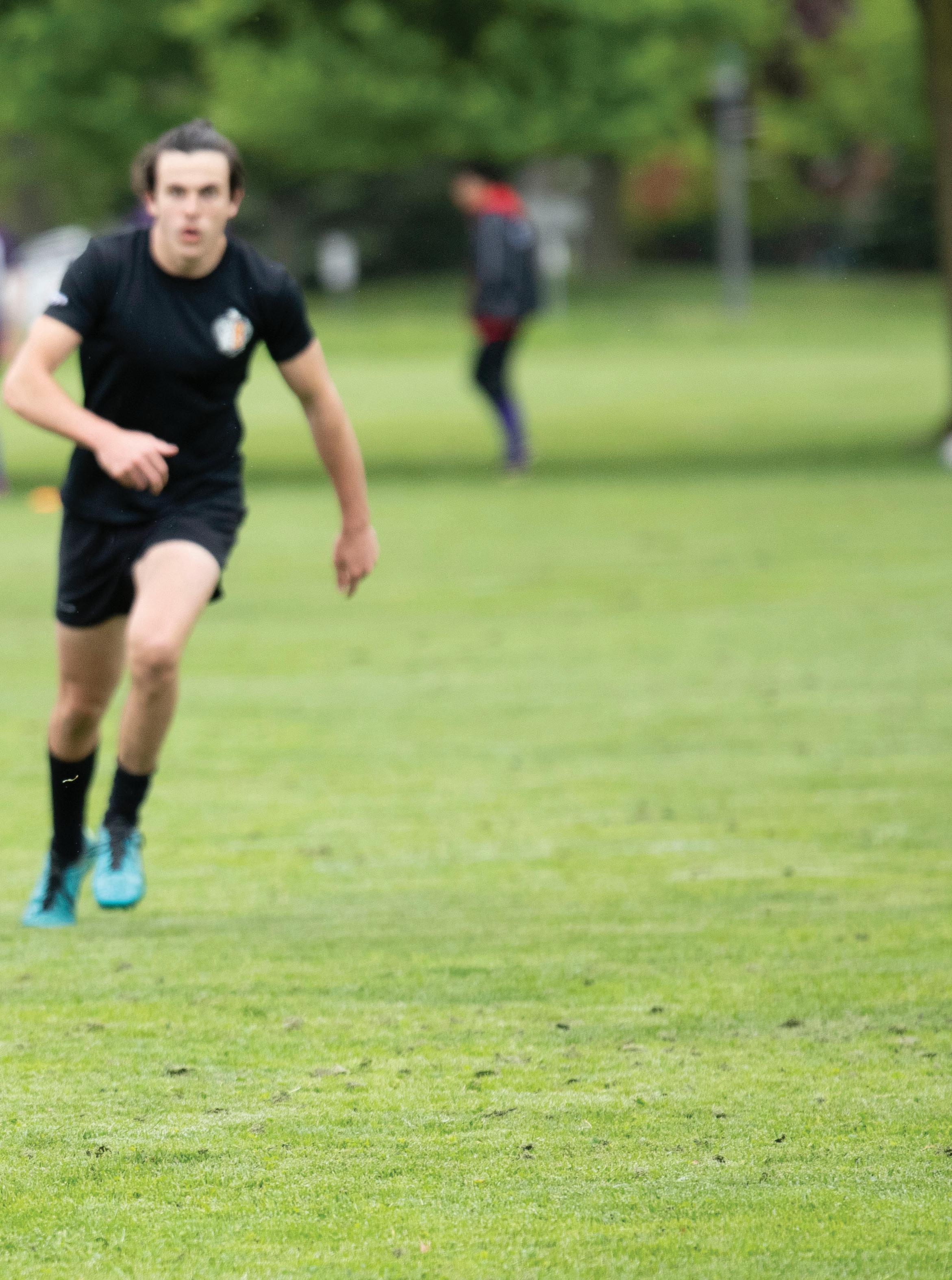 The Upper School rugby team faces off against Crestwood on A-Squad.
The Upper School rugby team faces off against Crestwood on A-Squad.
The Class of 2022 celebrates its graduation with a cap toss.
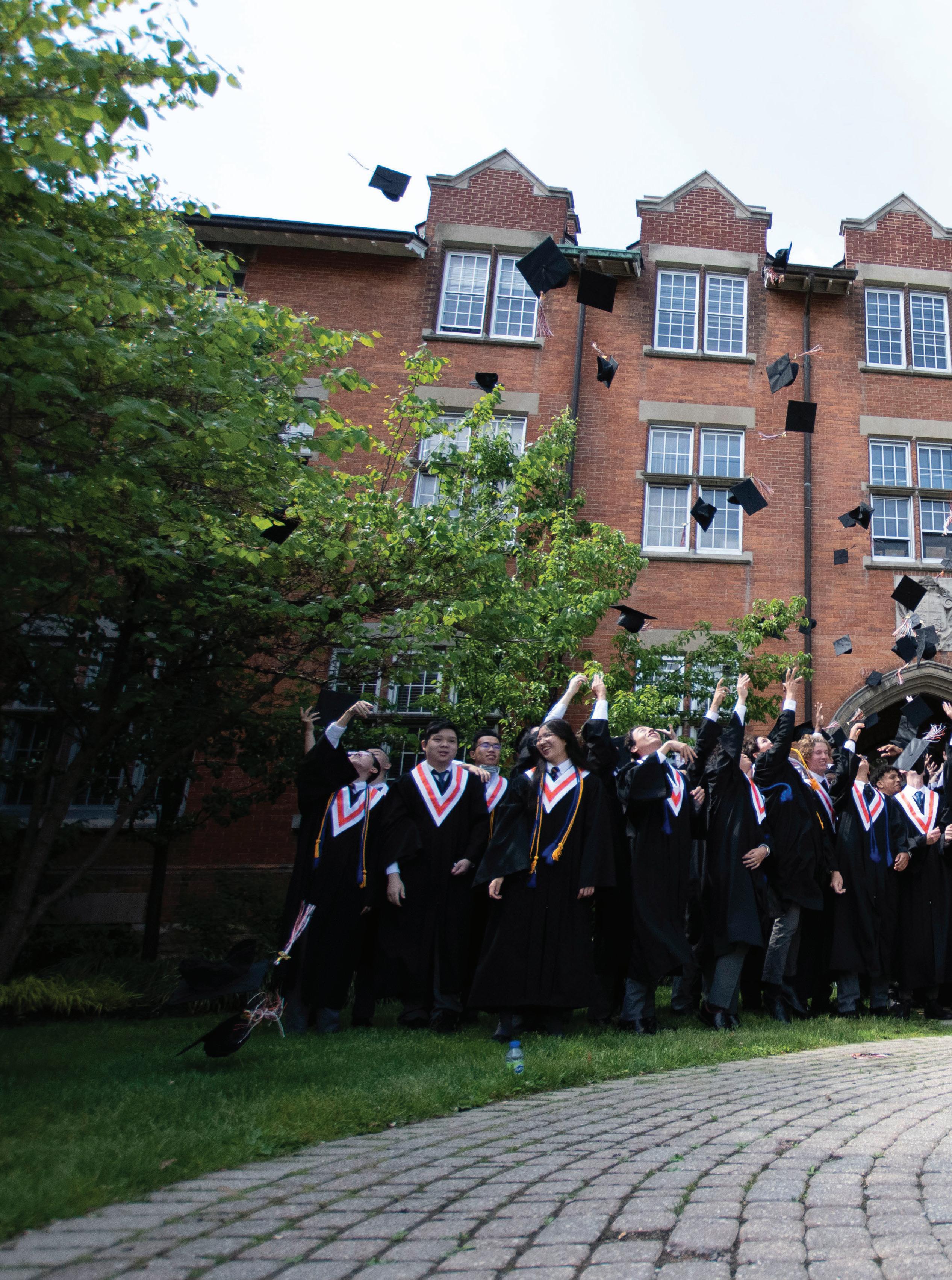
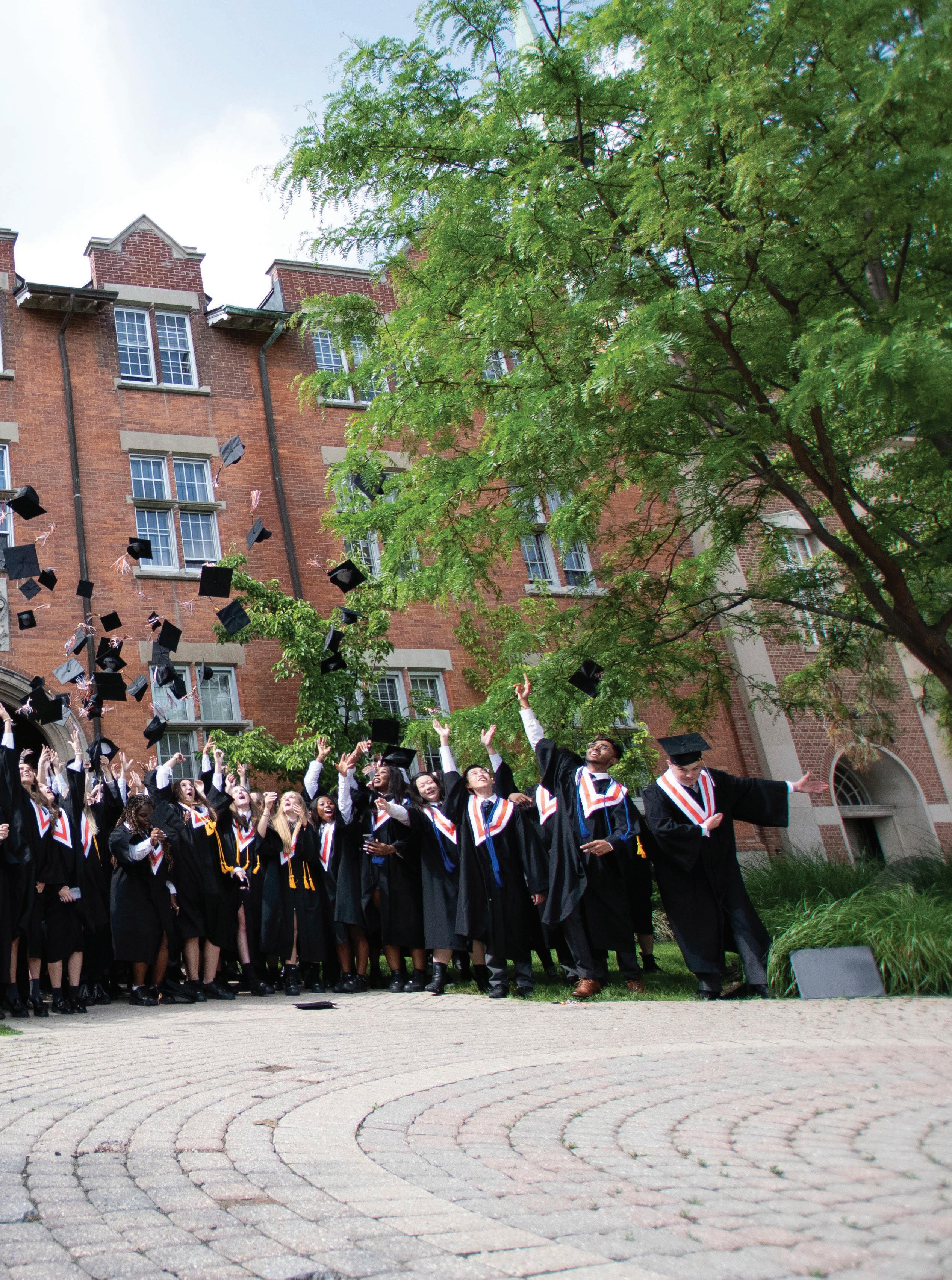
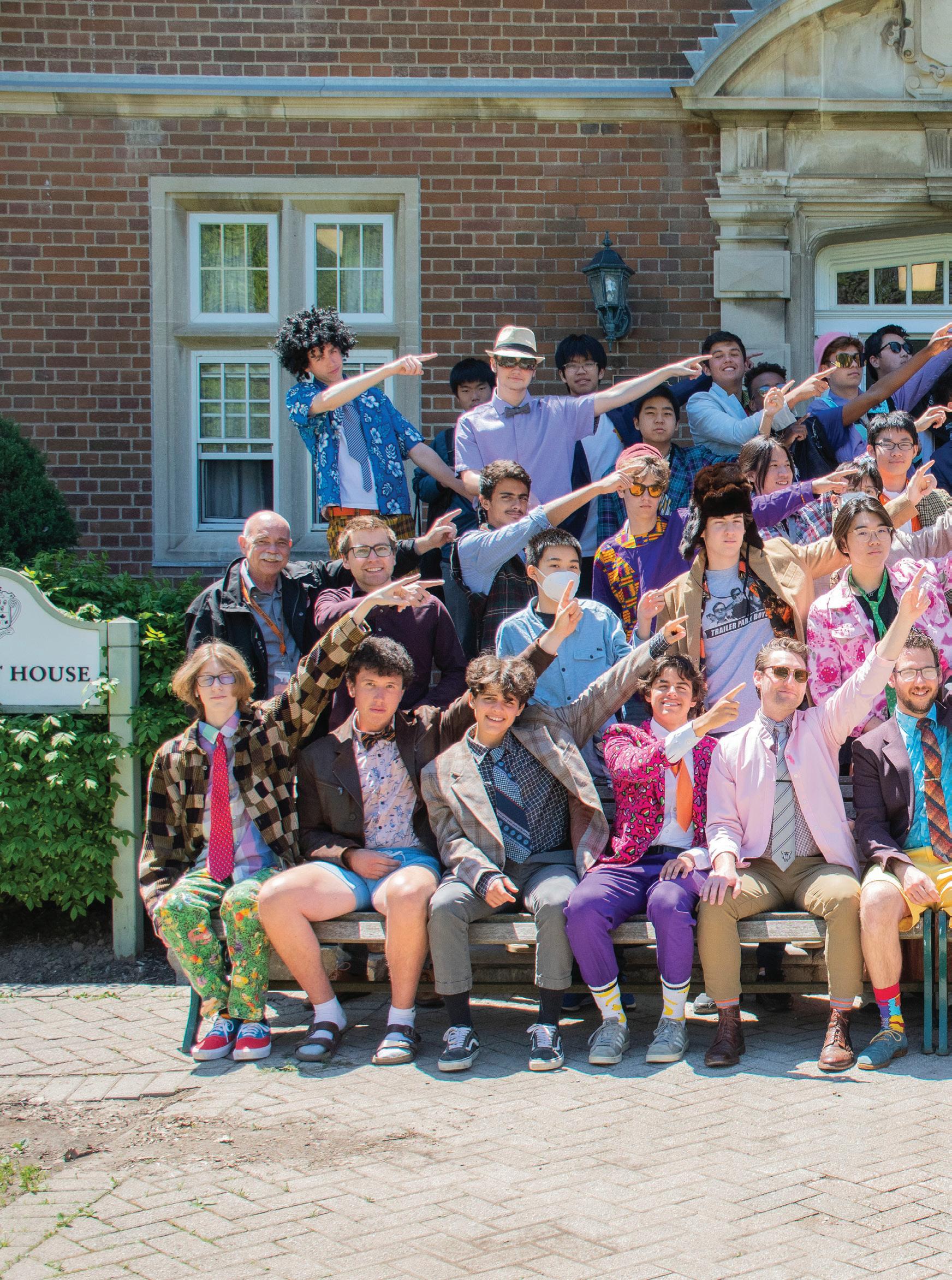
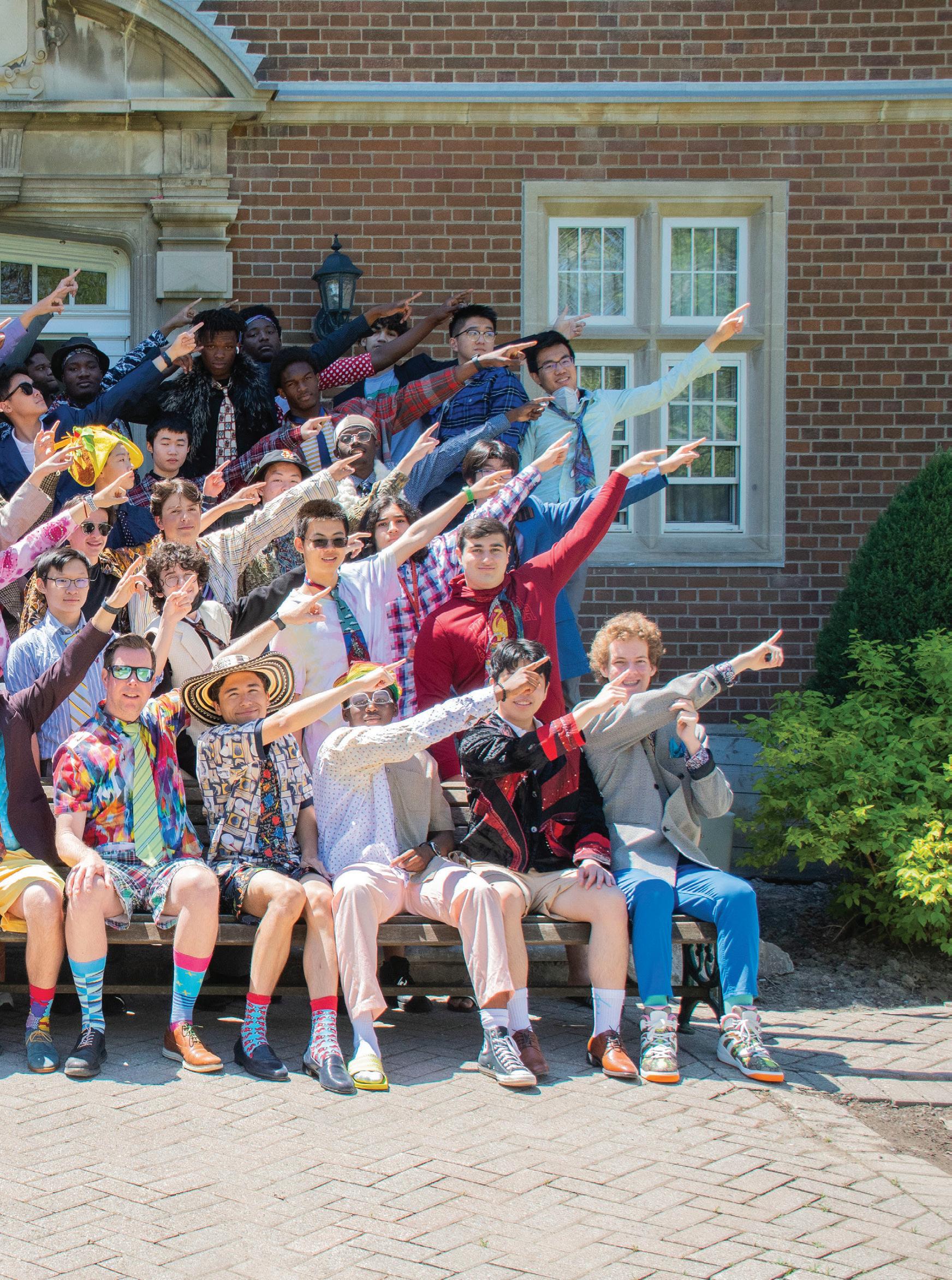 Merritt North House celebrates Frau Day in honour of a past student's unique fashion sense.
Merritt North House celebrates Frau Day in honour of a past student's unique fashion sense.
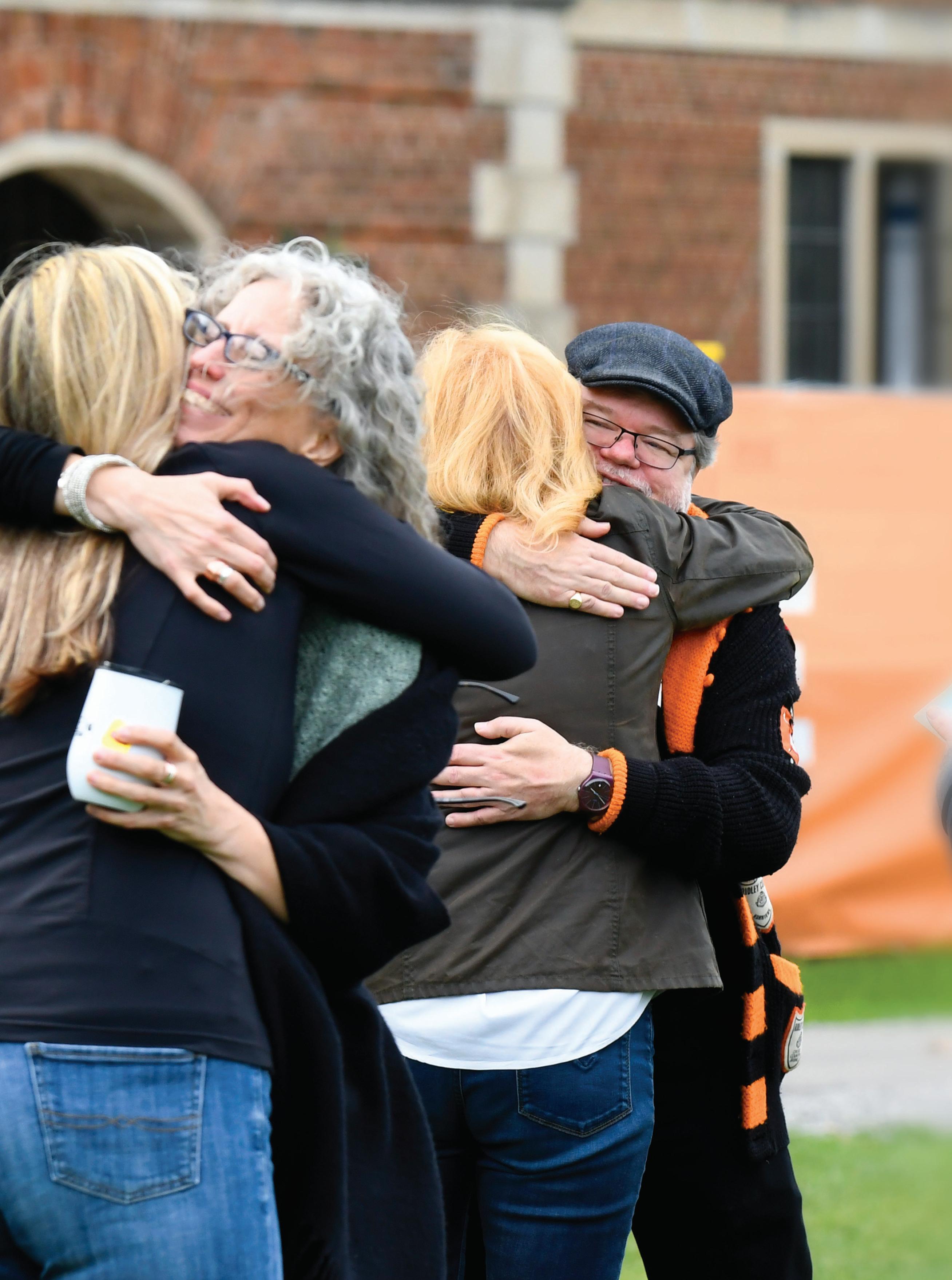
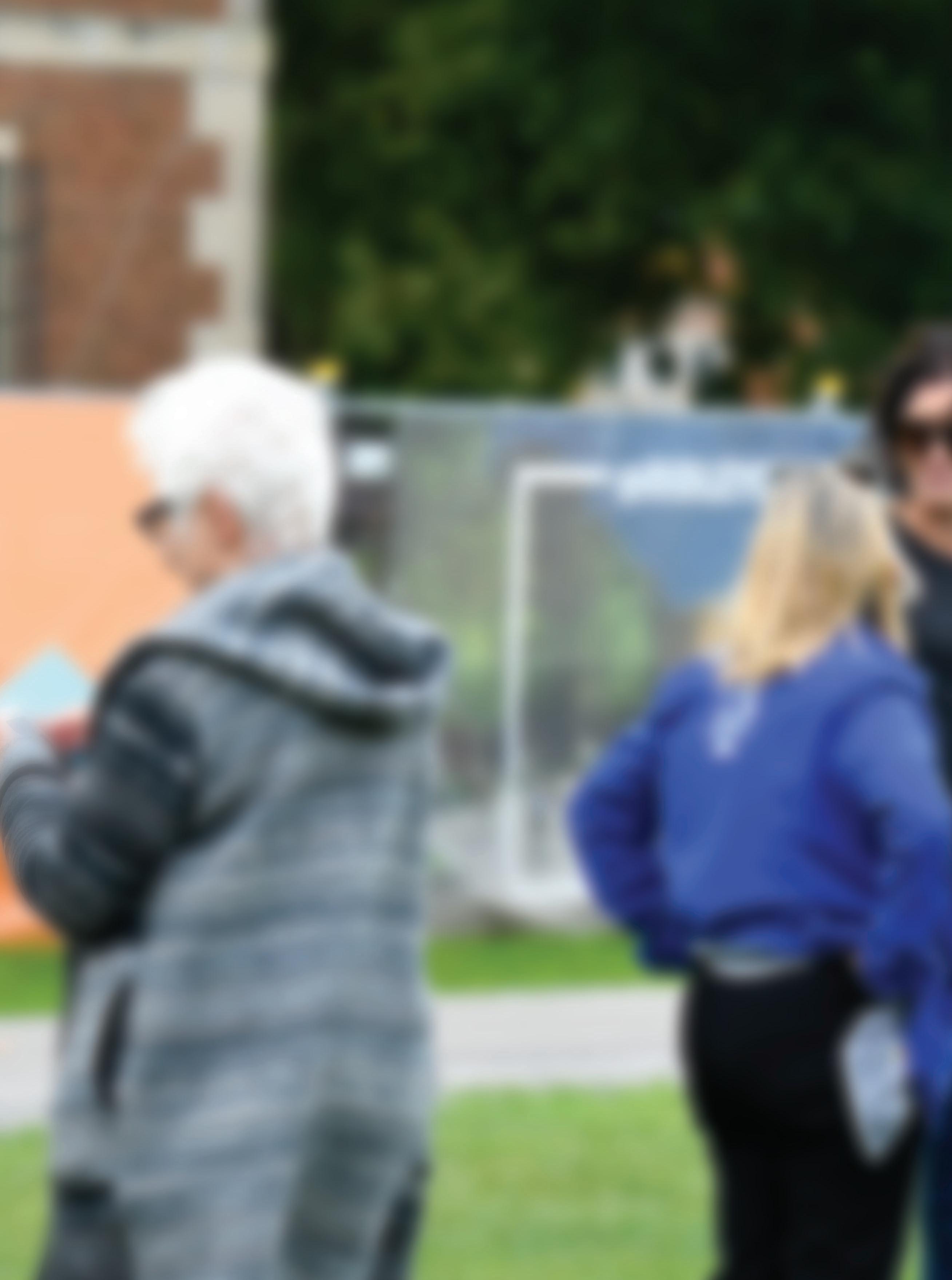 Old Ridleians returned to campus for a record-breaking Homecoming weekend.
Old Ridleians returned to campus for a record-breaking Homecoming weekend.

Two Ridley students, (Layla) Xin Chen Tao '22 and (Carina) Hongyu Zhu '23, organized a riveting virtual presentation that invited four female speakers in programming, engineering, pharmacy and astrophysics—Anna (Mackenzie) Rosen '07, Elana Nicholls '06, Yuanyuan Shi and Karen Lee-Waddell—to share their experiences studying STEM and talk about overcoming gender barriers in the field.

Ridley College was honoured to welcome globally acclaimed educator, New York Times bestselling author and founder of the Moral Courage Network, Irshad Manji, back to campus in March.
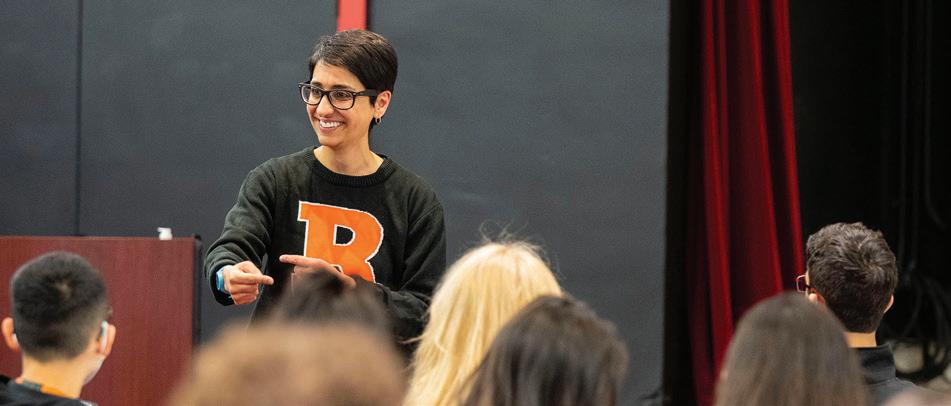
Professor Manji hosted a series of workshops and conversations to teach our students, parents, faculty, and staff about the Moral Courage Method—a framework for communicating and
developing relationships across divides. She will continue to mentor our students remotely through the We the Plurals club.
We look forward to learning from Professor Manji in the future as we continue to integrate the teachings of Moral Courage into the fabric of our academics and campus life.
Writers, poets, creators, and speakers gathered in Williams Hall for the 35th Annual Literary Dinner on April 1st. Our Upper School students enjoyed a fantastic dinner, awards ceremony and inspiring speech by our guest of honour, Dr. Natalee Caple, an author and Associate Professor at Brock University.
Last May, loved ones of our JK to Grade 5 students joined us on campus for the Lower School Student-Led Conferences. This was an excellent opportunity for our youngest Tigers to showcase all the hard work they've put into their academic studies.
We have broken new ground inside and outside the classroom this term, providing students with ample opportunities to collaborate and reflect in a diverse and rigorous learning environment. Leading with empathy and engagement, we continue our journey to teach the essential skills necessary to develop relationships across divides and lead in a global society.
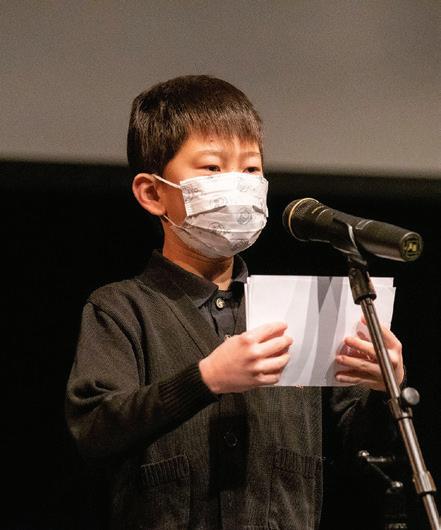
Our Lower School orators showcased their exceptional communications skills at this year’s Lower School Public Speaking Festival in March. From resilience to teamwork, the topics were presented with passion and had audience members hanging onto every word. Congratulations to all of our Junior and Intermediate Division winners!
On Wednesday, April 27th, eight Ridley College alumni took time out of their busy schedules to speak to our Grade 11 and 12 students about university, career paths and more at our Tiger Talks session. A special thank you to our contributors, Erin O'Rourke '11, Luca Bonifacio-Proietto '16, Megan Forrest '17, Cassandra Mitchell '17, Anthony Nguyen '18, (Tolu) Toluwalope Wright '18, Marlize Van Sittert '19, and Mia Kidd '21.
On February 22nd, our Public Speaking Competition finalists confidently stood on stage to deliver their speeches. Congratulations to this year's winners, who intrigued their peers and impressed the judges: Dr. W.H. Merritt Memorial Prize for Public Speaking (Senior): Catherine He '23
The Honourable Mr. Justice A. Courtney Kingstone Memorial Prize for Public Speaking (Senior Runner Up): (Tony) Kechun Wu '23
Ridley College Family Guild Public Speaking (Junior): Jocelyn Wang '24
Tony Kwok Award for Public Speaking (English Language Learners): (Raina) Yiran Wang '24
Our intrepid inventors travelled to Ottawa this Spring to compete in the first in-person robotics tournament since the start of the pandemic.

Ridley Robotics had two teams compete in the Ontario Provincial Finals: Team 1509B: (Nolan) Quoc Thai '23, Mahmoud Radwan '23 and Nikita Malkov '22 and Team 1509Z: (Abby) Yifei Peng '22 and (Layla) Xin Chen Tao '22.

Both teams exhibited perseverance, determination and creativity throughout the competition—forming challenging alliances, repairing their machines between matches and facing off against tough teams. And, while they may not have advanced to the next stage of the competition, these Tigers took home something even more valuable—an unforgettable experience.
A group of intrepid Ridley debaters took part in the Winter Fulford Debate, hosted virtually by Ashbury College in Ottawa on Friday, February 11th. Topics for the day ranged from adolescent discipline to companies’ attitudes towards human rights and how they might impact their consumers. The Junior

team was represented by Ferris Wen '24 and Phillip Myung '24. Seniors participating in the event were Amy Lu '23 and (Tom) Hanlin Hu '23.
Congratulations go out to these four students who gained valuable debate competition experience against very seasoned competitors from schools across the province!
Our
Sierra Darmaga '23 won a Regional Gold Key award in painting from the North American Scholastic Art and Writing Awards. Sierra now moves forward to compete in the U.S. National level awards with her oil painting entitled Longing . Good luck in the next round of competition, Sierra!
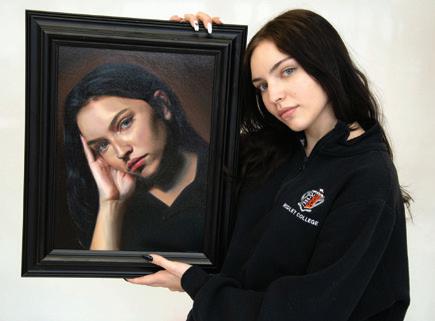
The Mandeville Theatre was filled with laughter during the onenight-only performance of On Err—a compilation of two oneact comedies, "Check Please" by Jonathan Rand and "The Radio Play Disaster" by Don Zoldis—on March 4th. The performance also streamed live, providing remote audiences worldwide with the opportunity to observe the overflowing talent of Ridley's thespians. Congratulations to the cast and crew who put together a fabulous show after a term of uncertainty!
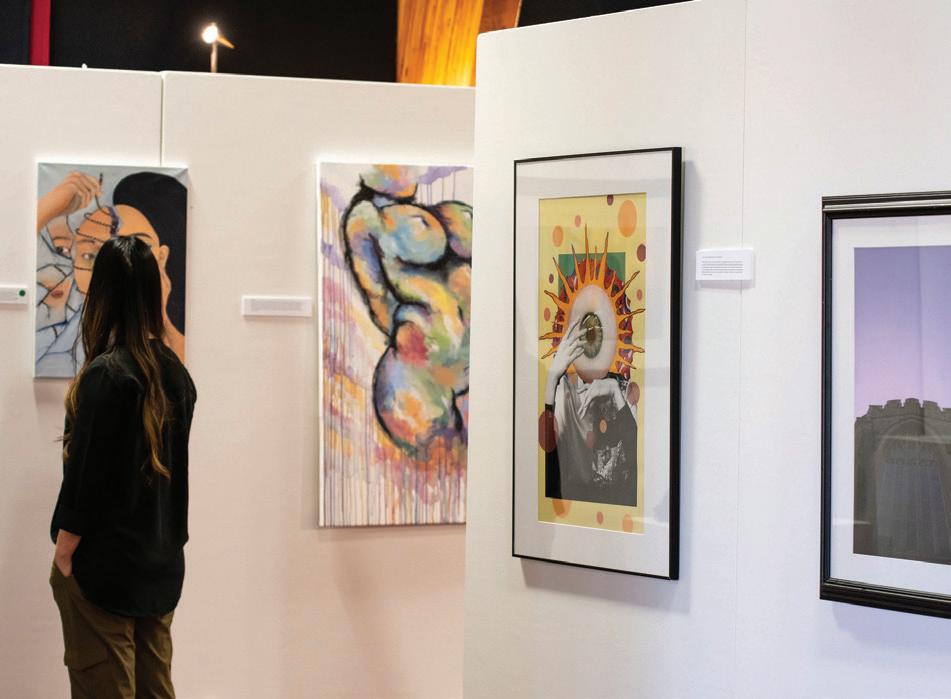
This year's Arts in April event proved once and for all that April is the coolest month at Ridley College. The month-long celebration kicked off with the Ridley Independent Film Festival (RIFF) on April 13th, which showcased a thrilling programme of short films by our IB Film students. This event was followed by the IB2 Arts Exhibition and Arts Assembly, and culminated with our annual Arts Awards ceremony, which acknowledged both the academic achievements and exceptional performances of our student-artists this year. Congratulations to our winners!

artscommunity gathered to celebrate student achievement in the arts and revel in the outstanding creativity and talent of our young artists. From music and visual arts to film and dramatic productions, our fine arts students dazzled audiences both on and off campus with their artistic prowess and technical mastery.
An abundance of talent graced the stage during our annual Amnesty International Concert on March 9th, which saw students, faculty and staff perform artistic acts of all kinds. When performers weren’t showcasing their talents, the evening’s MCs were educating audience members on ways they can get involved.
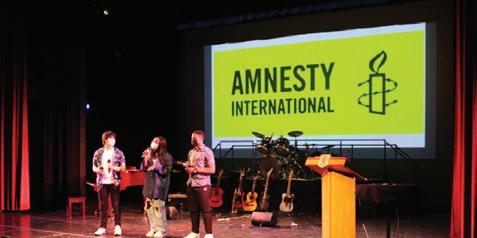
On June 2nd, our Lower School and Upper School musicians undertaking private lessons performed a recital in the Mandeville Theatre. It was truly a showcase of our students’ talent and virtuosity and a testament to our exceptional music programme at Ridley College!
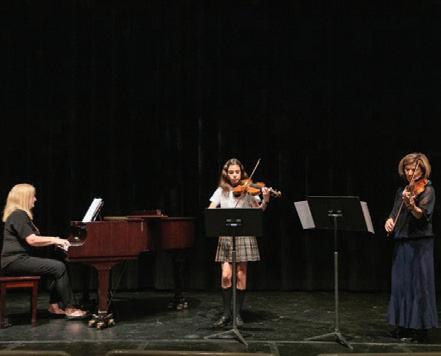
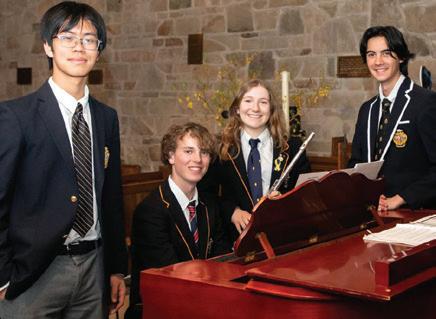
The Ridley College Jazz Combo received a Gold Standard award at this year’s National Musicfest competition. The students worked well together, making all decisions about the structure of their performance as a true jazz collective. Comments from the competition adjudicators were effusive in their praise of our performers' technique and artistic sensibilities. Congratulations to Clare Carter '23, (Tom) Hanlin Hu '23, Stephen Babin '23 and Will Clayton '22!
Look at all that positivi-TEE! Our Grade 10 Visual Arts students designed and screenprinted positive messages onto t-shirts. They were spotted wearing them around campus and spreading joy this February. We love watching our students nurture their personal wellbeing and inspire their peers through creative expression!

In February, our Grade 9 students flexed their creative muscles during a fun and engaging Arts Day for their Saturday programme. These students were empowered to try their hand at ceramics, pick up a musical instrument, take to the stage, or paint their hearts out.
Outside the academic day, a few of our boarding Houses opted to get messy with paint during a guided Paint Night. For Gooderham West, the activity was led by student, Chimemelie Okafor '22, who planned the event for her CAS Project. In Lower School, our Burgoyne Bears painted a winter scene thanks to the guidance of faculty member, Ariadni Harper.
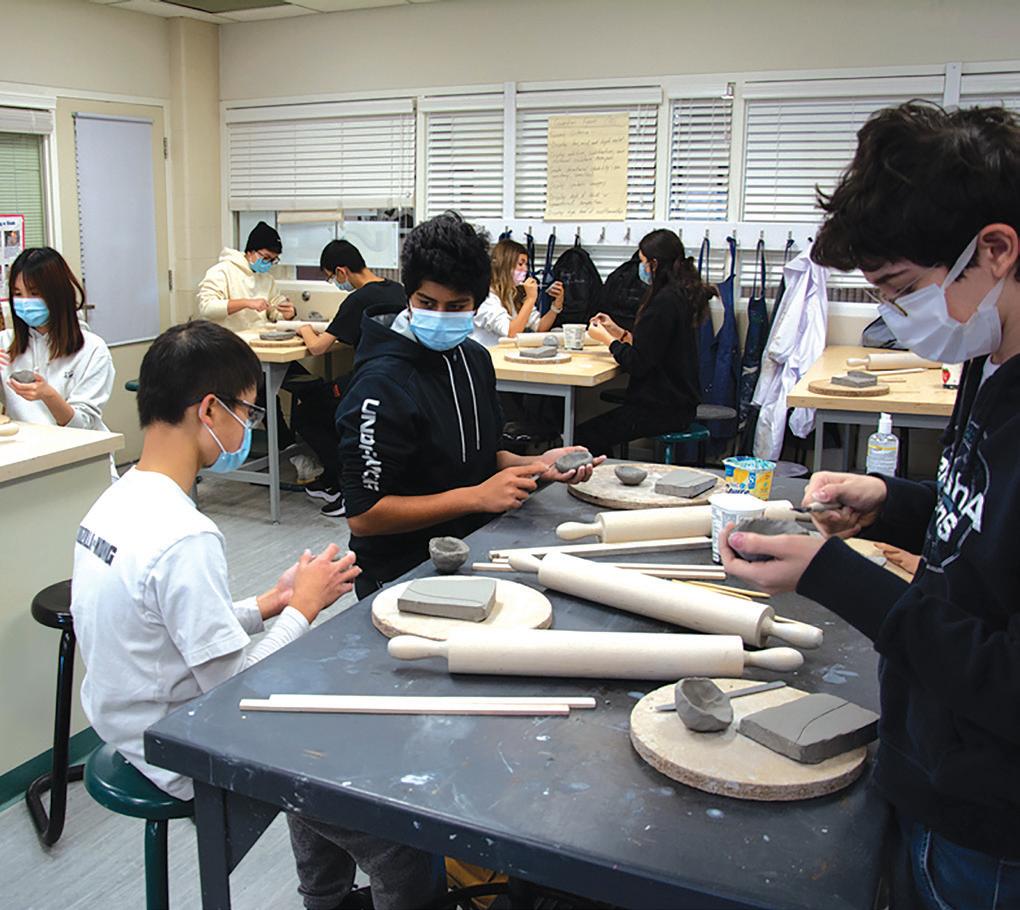
with T-ShirtsRidley Rocks at Annual Amnesty
With competitive sport back in full swing, our Tigers reached towering new heights, electrifying crowds at home and abroad and showcasing the extraordinary talent and ability, as well as the unbreakable spirit, of our student-athletes.
Many in our community know the powerful story of Dylan Kalambay '22— our PG student-athlete who made his triumphant return to the court less than a year after having a life-saving heart transplant.
In September 2021, after a long and challenging recovery, Dylan stepped back onto the court to pursue his dream of obtaining an NCAA Division I
scholarship, becoming the first player ever to do so with a donated heart.
Dylan’s story of hope, perseverance and wellness was captured in a touching documentary, Heart and Sole: The Dylan Kalambay Story, produced by Canadian Blood Services, which raises awareness about the powerful impact of organ donation.
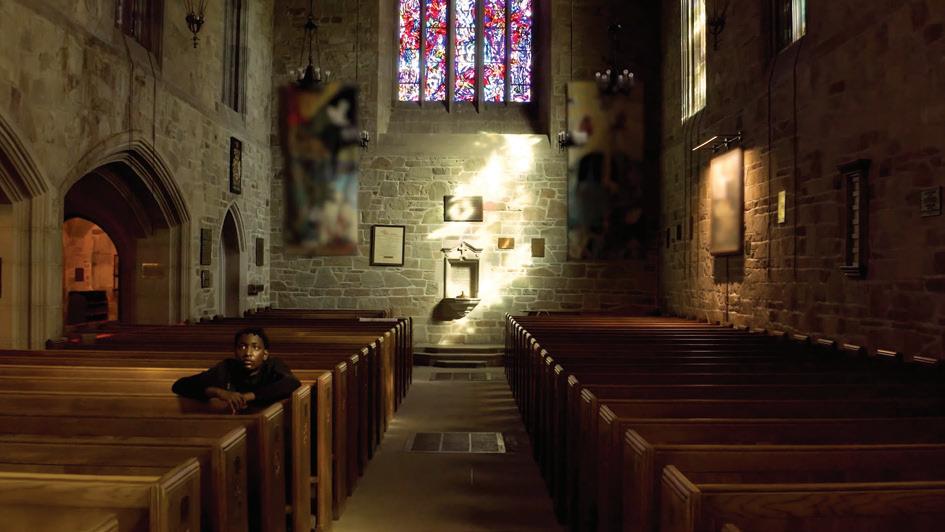
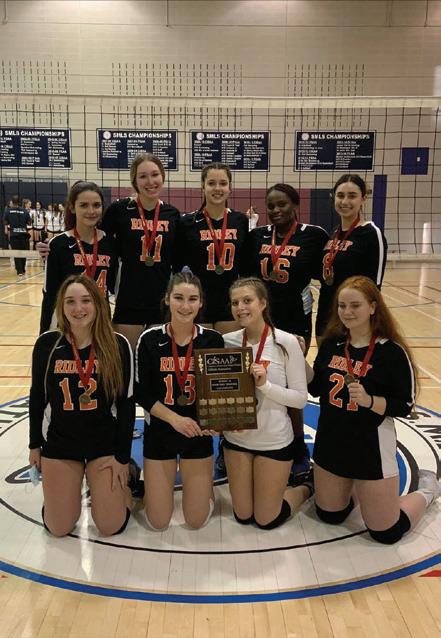
Congratulations to First Girls Volleyball who captured the 2022 CISAA Championship in a five-set nail-biter against St. Mildred’s Lightbourne School. We’re extremely proud of these Tigers and their resiliency during another unique season!
Fresh off a 6-4 win over Rice Memorial and a 4-4 draw against Albany Academy, Ridley's Prep Boys Hockey team triumphed over The Hill School 3-2 to claim this year's Prep Alliance Championship.

During the spring term, all U14 teams earned a spot in their respective championship tournaments. Special shoutout to U14 Boys Rugby who captured CISAA gold!

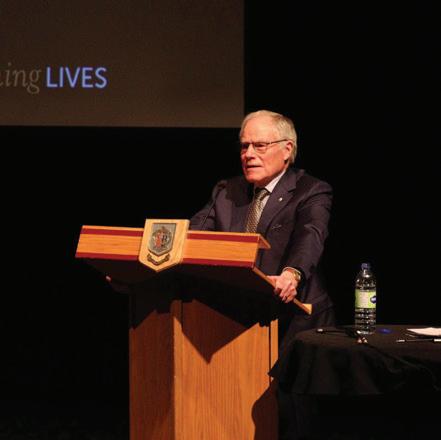
Our MGI-Gordon Distinguished Speaker Series resumed on Tuesday, April 5th with a riveting talk by Dr. Bruce Kidd. One of Canada’s most accomplished and influential athletes and academics, Dr. Kidd gave an inspiring talk about his impressive athletic career, his activist work in sport, and his new book, A Runner's Journey before fielding questions from an enthusiastic crowd.

At the 2022 Canadian Secondary School Rowing Association (CSSRA) Regatta, Ridley crews qualified for 18 finals, capturing 13 medals in total, the most of any other programme. Following the regatta, we had the honour of celebrating Ridley


On Saturday, February 26th, we closed out a chapter in Ridley's history with the last official game on the Ridley squash courts—the annual Bulldog Championship. Nathan Mandigo '22 was the men's champion and Caitlin Ng '25 was the women's champion.

After a year off due to the COVID-19 pandemic, the Ontario Ergometer Championships returned to Ridley College on March 5th. The event, hosted by the Ridley Graduate Boat Club, marked the first in-person indoor rowing competition held in the province in almost two years. This year's event featured student competitors from 21 clubs and high schools across Ontario. Our athletes performed well, with seven top 10 finishes.
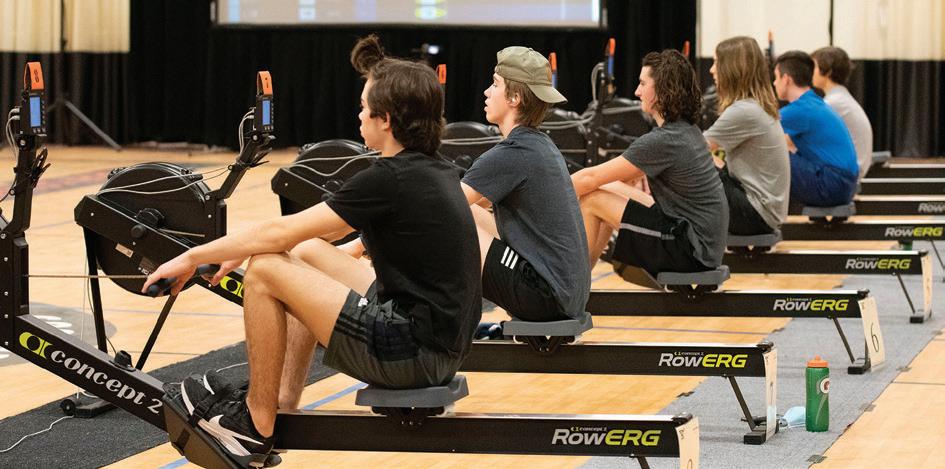
The Ridley College Cadet Corps No. 162 RC(A)CC was blessed with blue skies for the return of Church Parade and Cadet Inspection on Sunday, April 24th. Spectators enjoyed a brief Church Parade that saw Drum Sergeant Major Nathan Mandigo ’22 successfully toss the mace over the Marriott Gates, followed by the 113th Cadet Inspection.
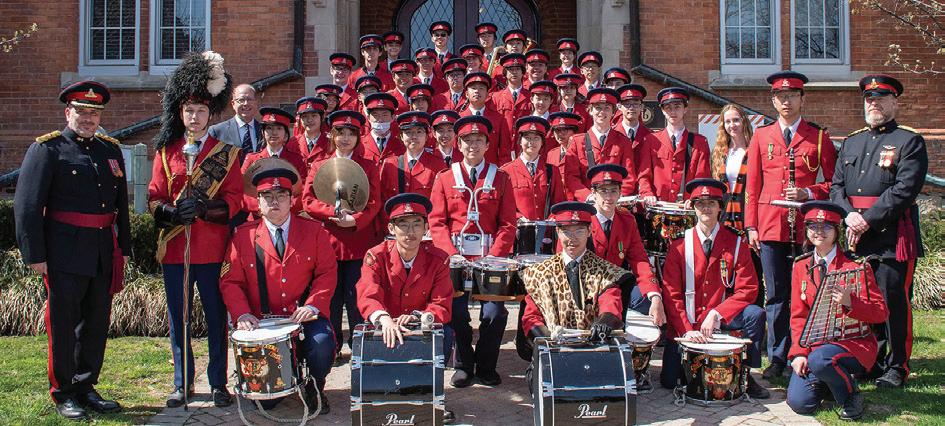
In May, a group of young Ridley altruists generously contributed their time to help the Niagara Peninsula Conservation Authority (NPCA) restore the tree population lost to the dreaded Ash Borer. Our students helped to plant 1000 trees and shrubs in parks in Grimsby and St. Catharines. It was hard work but very rewarding for those involved. Great work, Tigers!
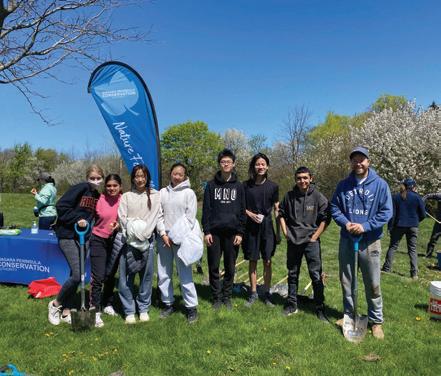
On March 4th, the Ridley community donned their silliest pairs of socks and donated $2 for Silly Sock Day, a student-led initiative spearheaded by Nathan Nitsopoulos ’29 to raise money for local Niagara charity, Socks for Change. This wonderful organization provides high-quality, Canadian-made wool socks and winter accessories to schools, not-for-profits and outreach programmes in the Niagara Region.
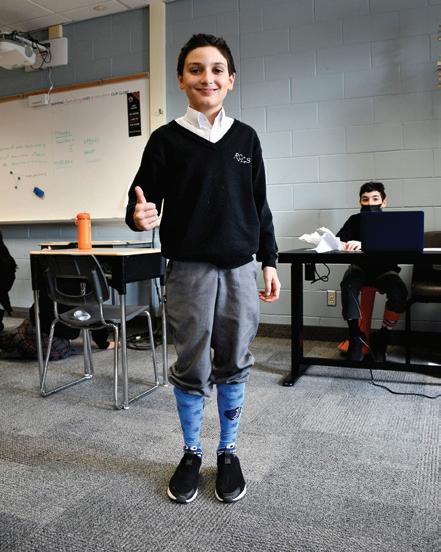
We are pleased to report that the event raised $800 for those in need. We applaud members of the Ridley community for their dedication to our school motto, Terar Dum Prosim –may I be consumed in service.
In January, our students and teachers spent time learning about and reflecting on mental health, self-care and positive emotions during Mental Health Awareness Week, hosted by our own Jack.org group. Upper School students engaged in important conversations about self-care, heard from two Jack.org speakers as part of our Flourishing Speaker Series and had important debriefs on how they can support their mental wellbeing.
As a follow-up to the activities of Mental Health Awareness Week, Ridley encouraged staff and students to take to social media to promote mental health for Bell Let’s Talk Day.
Our trailblazing students broke new ground in their charitable endeavours, innovating creative, dynamic solutions to growing local and global concerns. From raising awareness and supporting charities to spreading kindness and hastening important conversations, our Ridley altruists demonstrated their unwavering commitment to inspiring flourishing lives and transforming our globe.
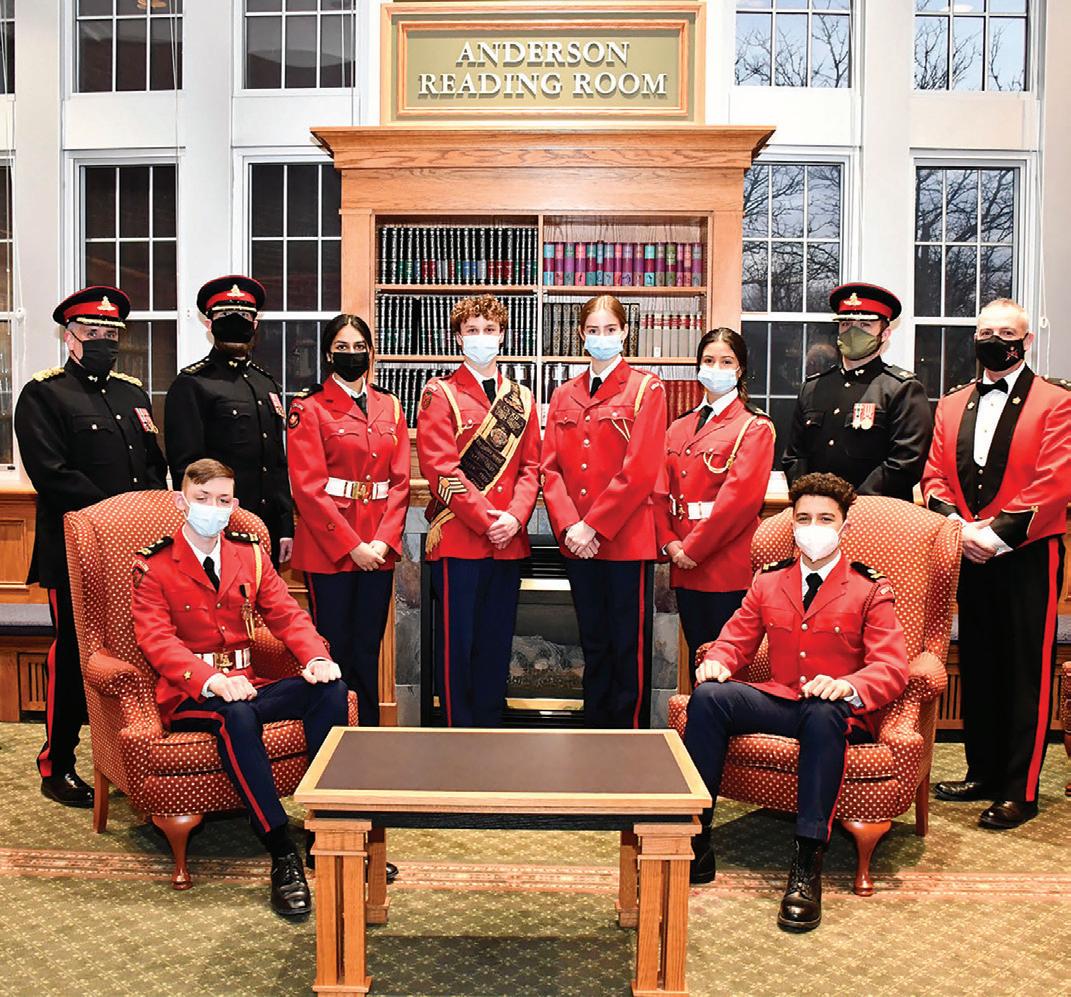
On February 24th, our cadets gathered in the Great Hall for one of Ridley's oldest traditions, the annual Cadet Officers' Mess Dinner.
This proud tradition provides Ridley officers, both senior and junior, the opportunity to interact among themselves, practice cadet traditions and foster an esprit de corps Delicious food, wonderful conversation and an inspiring speech by Captain Michael Mathieson offered the perfect chance to celebrate our student leaders.
In April, our student-led environmental club, the Green Tigers, organized Eco Week, encouraging students to reduce, reuse and recycle. Events continued into the weekend with students engaging with earth-minded service experiences.
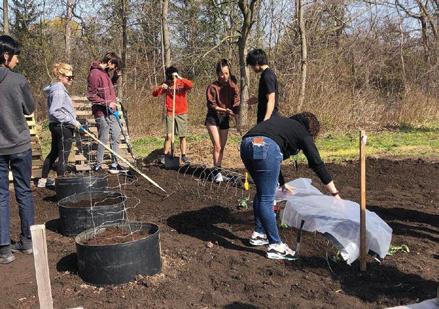
In February, we celebrated Random Acts of Kindness Day, kicking off the event with a House challenge. Organized by our Flourishing Council, each House had until March 4th to complete 133 acts—one for every year of our school's existence— that spread kindness and love. Our students are often seen putting positive notes around campus or lending an ear to listen, so it was not a stretch to assume that they would surpass the goal!
On April 13th, the Ridley College Family Guild (RCFG) expressed its gratitude for our incredible faculty and staff during Faculty and Staff Appreciation Day! Not only were employees treated to cookies, but messages from the RCFG and students were posted for faculty and staff to read and enjoy.
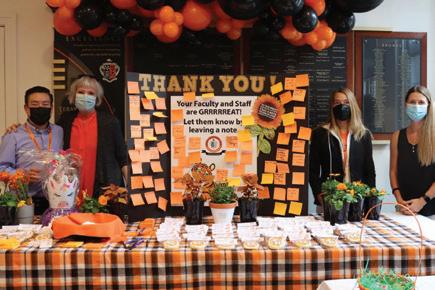

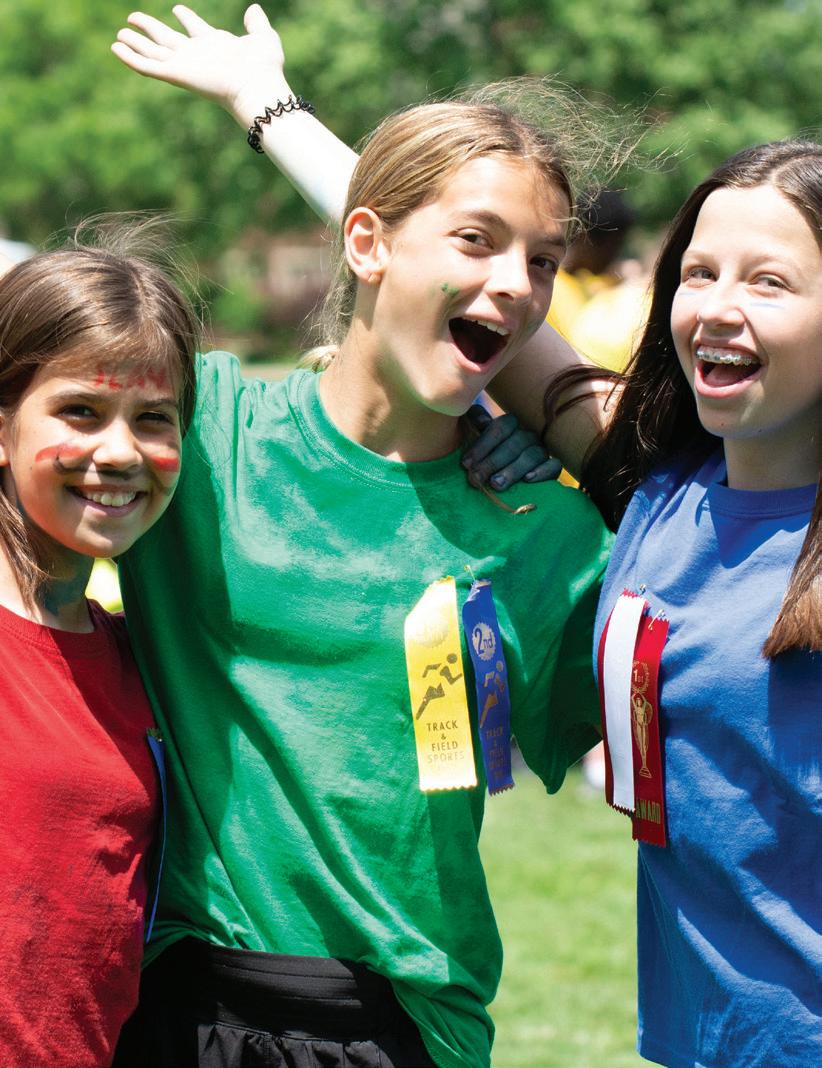
At the very heart of “belonging” is the word “long.” To be-long to something is to stay with it for the long haul. It is an active choice we make to a relationship, place … to a life because we value it.”
–Toko-pa Turner, Belonging: Remembering Ourselves Home
Ridlieans, like other humans, are social creatures. Our longing to belong, no doubt, was forged in large part in the crucible of a boarding school education—the Houses, the sports field and cadet training grounds. The success and size of our recent Alumni Association Homecoming Weekend were a testament to our collective “choice we make to a relationship … for the long haul.”
In the waning days of a global pandemic, and among the many possible silver linings rendered—we are, after all, more Zoom friendly, more skeptical of office work, more weary of long commutes and grand social gathering—there grows a gnawing emotional and deeply human need—the need to belong. Despite the predictions of a post-pandemic new social norm, I believe there grows a powerful recognition of the vital role belonging plays in our healthy functioning as a society. In 2009, a decade before we knew the term COVID-19, the Center for Disease Control prioritized “belonging” in their recommendations and strategy for schools as a matter of disease prevention among student
populations. The concept remains a focus in a variety of fields, including architecture, design, urban planning, economics, and education.
Like air and water, belonging is a deep-seated human need that many social psychologists argue was an evolutionary advantage for our species. Yearning to belong to the group, and committed to cooperating in the tribe, it was our uniquely human ability to co-operate and work toward a common goal—although opposable thumbs helped—that marked the ascendancy of human beings. Although the war in Ukraine might be an opposing argument, in the long run, history might just identify at least one universal benefit to the pandemic an increase in global cooperation and a new age of human connection, thanks in large part to the realization that united we can overcome complex and dynamic global challenges.
Some argue that the social isolation experiment forced upon us due to a rampant disease would result in an historic shift in human activity—gone would be the days of face-to-face

meetings, offices would sit fallow, the shopping experience would be transformed into an online transaction from the comfort of our homes, and movie theatres would become a relic of a silver screen past. Education would also transform into an online synchronous (or better yet, asynchronous) experience and collection of skills and learning credentials. Instead, I think we are witnessing the exact opposite. Employees miss the water cooler, consumers enjoy the shopping mall vibe and Netflix will never replace the smell of popcorn in a dark cinema. In education, the pandemic reminded us of a few simple truths. First, that human interaction is at the heart of the learning experience, that belonging is an essential ingredient in successful schools, and that place, people and programme are hard to replicate via a computer screen.
In September, amidst record enrollment, we welcomed the largest number of new Ridleians in our school’s history. 265 new students (and their families) entered the Marriott Gates to begin their Ridley journey. A journey, I posited to this captive audience, which for many of them, will last for the next 60 years. As educators, our annual challenge is to welcome these newest Ridleians and help them to feel like they are known, they are seen, and they are respected. In short, to make them feel like they belong. With such a diverse student population, this is a challenging task.
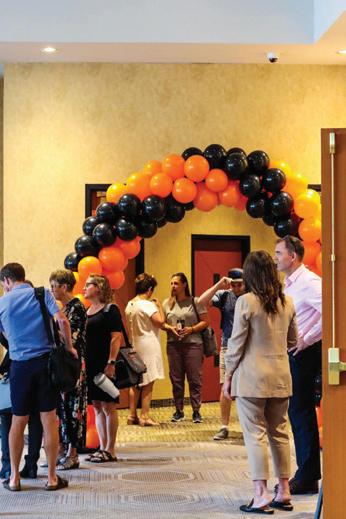
So, we began by dedicating the year to the simple one-word theme—Belong. This August, as part of our commitment to professional learning, collaboration and school improvement, faculty and staff gathered to kick off our orientation week. We do so again for half-day workshops throughout the year with the purpose of advancing our craft and learning together in community.
This year, we hosted a full-day, off-campus faculty and staff conference coined the Belong Conference. Facilitated by our Director of Wellbeing, Mrs. Hanna Kidd, the Belong Conference was a day filled with a combination of direct instruction, small group discussion, reflection, and activity, all centred around a few essential questions: What does it mean to belong? What does it sound, feel and look like in action? How does one belong in a community like Ridley? How can we ensure our colleagues feel that they belong? How can we enhance a feeling of belonging in each of our 764 students, their families and our alumni?
Of course, in addition to brushing up on the science of belonging and dedicating ourselves to some essential habits, at the literal end of the day, the experience left us standing as a more united, more connected whole. Peers understood the visceral feeling of belonging.
Once the school year commenced, and community rituals returned after a two-year disruption, we witnessed some very intentional belonging practices in action. “Welcome to

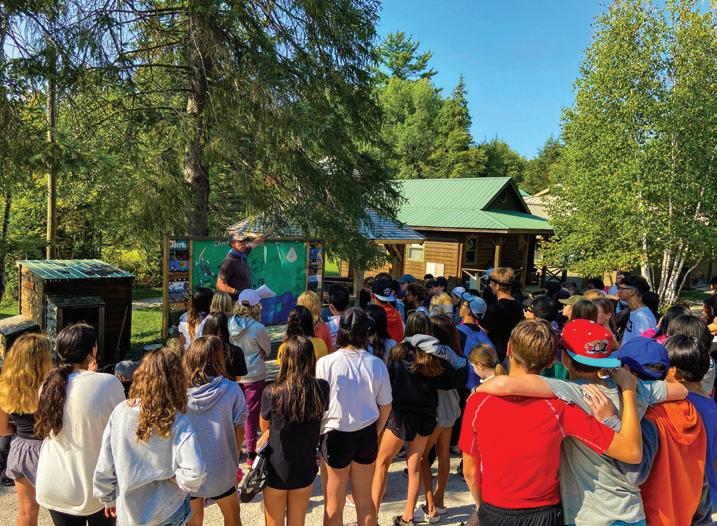
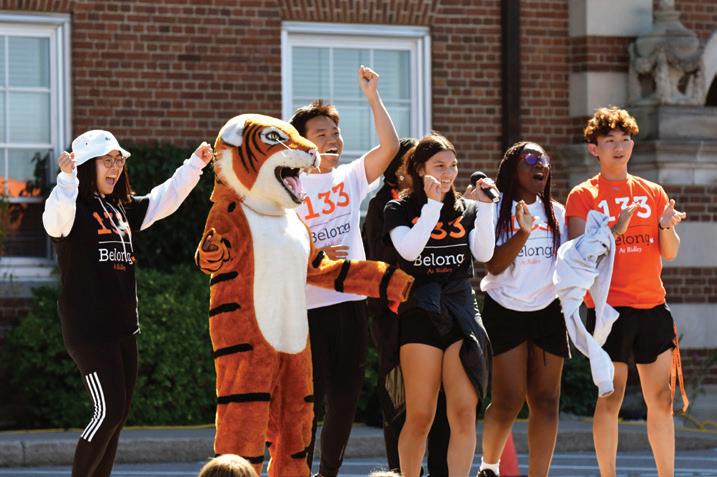

Ridley” Days, our three-day school orientation for new and returning students and parents; Upper and Middle School camp, and ROAR for Lower School students; Snake Dance; our 133rd Ridley birthday celebration and, finally, our historic Homecoming Weekend—all events designed to welcome, and promote our collective belonging to the larger Ridley community.
In addition to events, we also consider the use of physical space on campus, and how certain locations might promote relationships, community and a more profound sense of belonging. Traditional spaces such as the Memorial Chapel, the Great Hall and the Mandeville Theatre have served us well in this regard. As the on-campus construction activity proceeds, we are reminded daily that we are getting closer to the dream of our new and transformative learning facilities. The repurposed Iggulden Building will become the heart of our campus and of student activity. Inside, the Learning Commons, the Creative Commons, the Music Centre, the Performance Hall, and the café will be places of community. Add to this our new courtyard, the Athletic Commons and Jack Aylott Squash Centre and we will have created natural gathering points (watering holes, campfires and mountaintops in the language of educational theorist David Thornburg). Each new location will promote those moments when young Ridleians deepen their attachment to each other, and to this school community. They will be venues that promote belonging and deepen the sense that we are all part of something much larger, and more powerful than our individual egos.
At Ridley, belonging involves more than simply being acquainted with other people. It is centred on gaining acceptance, attention, and care from members of the group as well as providing the same attention to other members. It is a reciprocal human experience.
In Abraham Maslow's hierarchy of needs, belongingness is part of one of the major needs that motivate human behaviour. The hierarchy is usually portrayed as a pyramid, with more basic needs at the base and more complex needs near the peak. The need for love and belonging lie at the center of the pyramid as part of the social needs. More recently, psychologist Roy Baumeister noted this reciprocity, arguing that “we are deeply conditioned to provide a sense of belonging to others.”
Our need to belong is what drives us to seek out stable, long-lasting relationships with other people. It should come as no surprise that many discover this need in healthy, multigenerational communities like Ridley. It goes a long way to explain the deep-seated connection and commitment to the orange and black felt by thousands of Ridleians around the world and witnessed at Homecoming events and branch receptions when we come together to fill our glasses up. At Ridley, our hope is that each graduate internalizes the value of belonging and builds it in communities outside the Marriott Gates. If so, we’ll be one step closer toward inspiring flourishing lives.

In 2021, we refreshed our strategic priorities and established a renewed strategic plan, Leading with Heart, which you can review on our website. Our strategic plan has and will continue to guide our school improvement initiatives and accelerate several bold and innovative opportunities to renew our status as a learner-centred global community dedicated to human flourishing and the ideals of service.
On the next page, we have included a few highlights of the tremendous progress we have made on our goals and the work that remains to be done. We look forward to sharing future updates on our progress, and we encourage you to visit our website to learn more about how these priorities will guide our choices on the road ahead.

Strategic Plan
2021-2026
Reports shared to the Ridley community
5
Reports shared to the Board on these goals
A Learning Community
Established a new partnership with Irshad Manji, founder of the Moral Courage Project, whose mission is to empower students to hear, not fear, different perspectives.
Strategy 7 Engage Niagara
Created a multi-layered partnership with the 2022 Canada Games.
Strategy 8
Strengthening the Ridley Community
Designed and implemented a volunteer programme to align with volunteer interests and strengths to focus on reputation enhancement, alumni engagement, admissions support, and community engagement.
Ed Kidd, Headmaster
Bruno Petitti, Executive Director of Strategy and Innovation
Michele Bett, Deputy Head
Hanna Kidd, Director of Wellbeing
Pete Doyle, Director of Service Learning
Lance Postma, Assistant Head: Upper School
Michael Bett, Dean of Boarding
Ed Kidd, Headmaster
Andrea Nauf, Executive Director of Human Resources
Jay Tredway, Assistant Head: Co-curriculars & Community Connections
Melissa Stephens, Director of Strategic Communications & Marketing
A Learning Community Flourishing Lives
Terar Dum Prosim
Innovation in Boarding Innovation in Boarding
Global Ridley Flourishing Workplace Engage Niagara
We spoke with alumnus Tim Griffin ’68, whose hard work and passion for squash have been instrumental in the fundraising efforts for Ridley’s new state-of-the-art Jack Aylott Squash Complex. Here is what he had to say about the project:

“There is a rich legacy of squash at Ridley College. The school has produced some top players over the years—Victor Harding, Clive Caldwell, and Chris Stevens, to name a few. I got so much out of the squash programme, and I thought, wouldn’t it be great to see others get the most of it?”

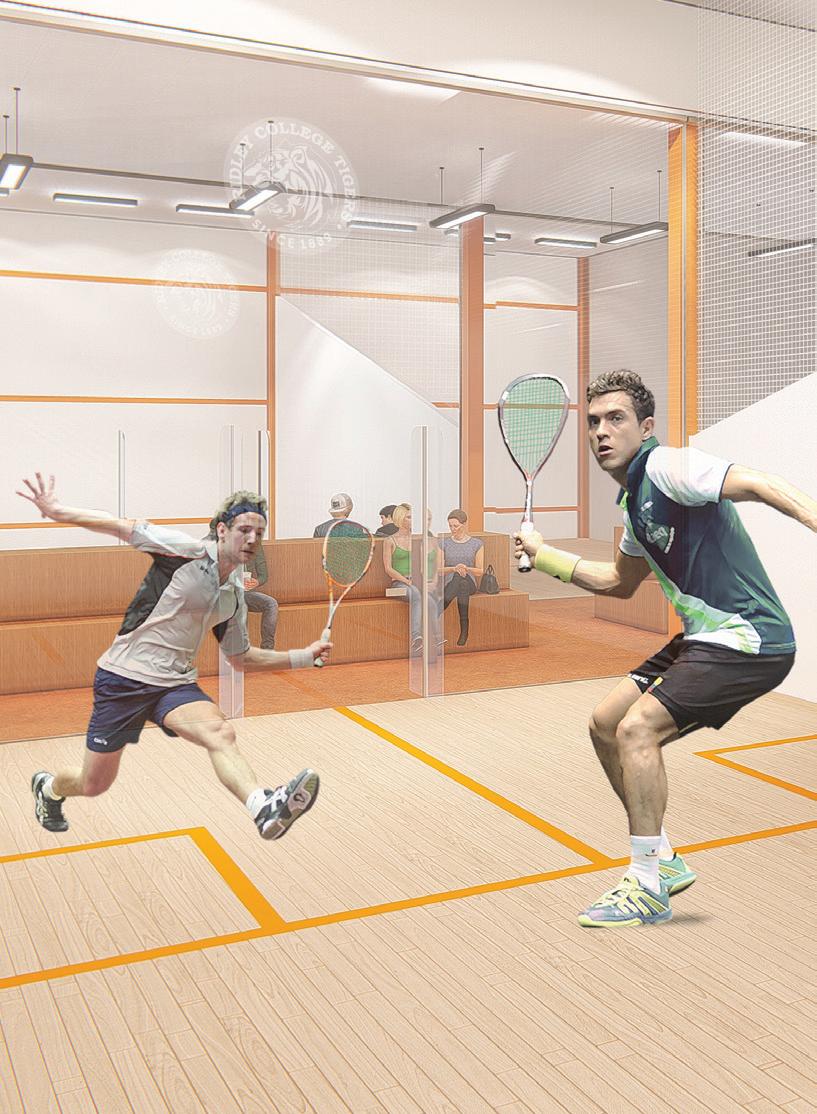
On the new facility:
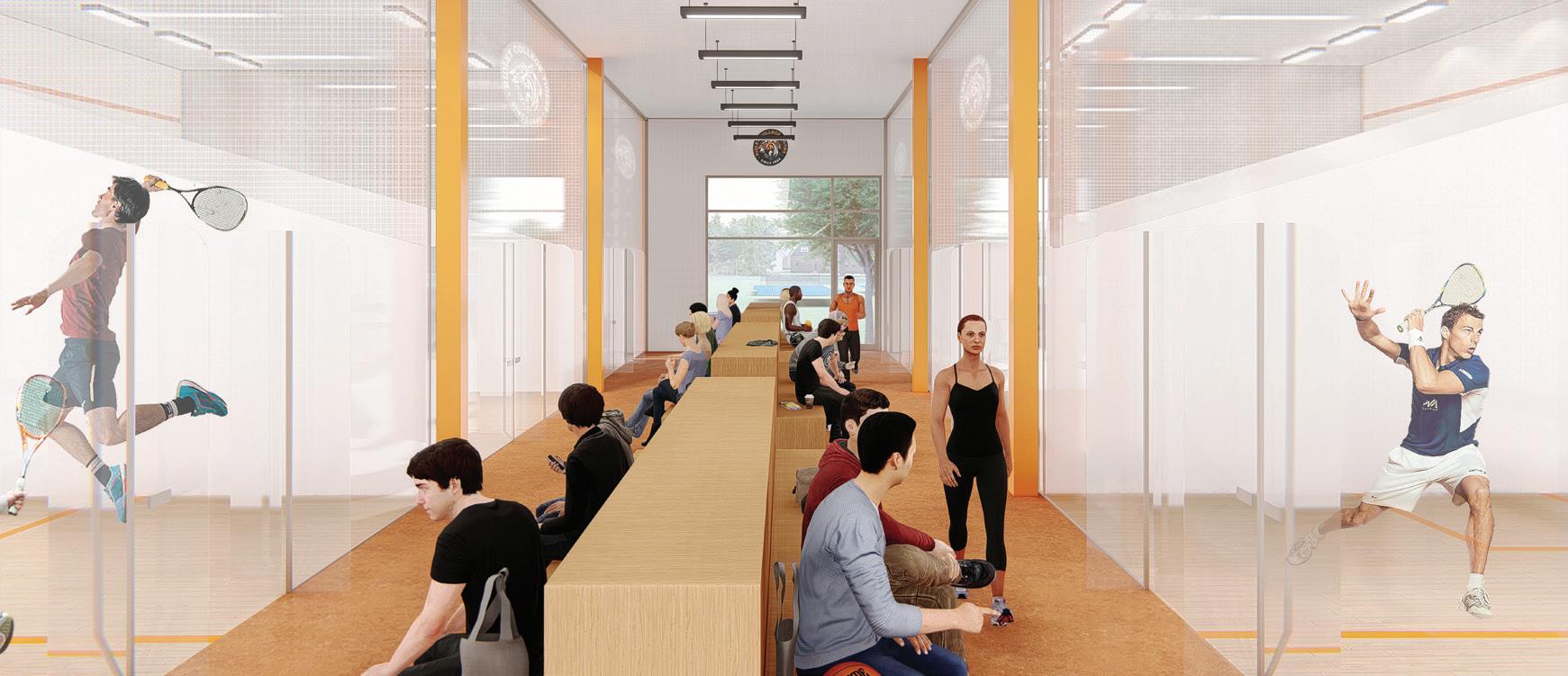
“The new Jack Aylott Squash Complex is going to be a state-of-the-art facility. If you’re going to take on a project like this, quality is a big word, and we wanted it to be as good as any squash centre anywhere today. No shortcuts because this space is going to be around for a long time. The complex has been designed with five courts in close proximity, including a show court that will allow a large audience of 150 people or more to gather and watch. The school will have the ability to host or co-host major tournaments and finals, the kind of big events that showcase the school and its top-notch squash programme.”
On the name:
“Jack Aylott was a Ridley icon. He was Gamesmaster at Ridley from 1951 to 1978, and all of us respected him immensely. He was universally admired, and we are thrilled to be able to name this new complex in his honour.”
On September 27th, 1888, 13 men sat down for an extremely important meeting, one that would be the defining moment for times ahead.
According to the book Ridley: A Canadian School, authored by Richard A. Bradley and Paul E. Lewis, the resolutions of this meeting were the following:
1) A Church school for boys practising Evangelical and Protestant principles was needed.
2) A school was required which would adequately prepare youth for education at the University of Toronto and Wycliffe College, the President and Principal (respectively) of which were present at the meeting.
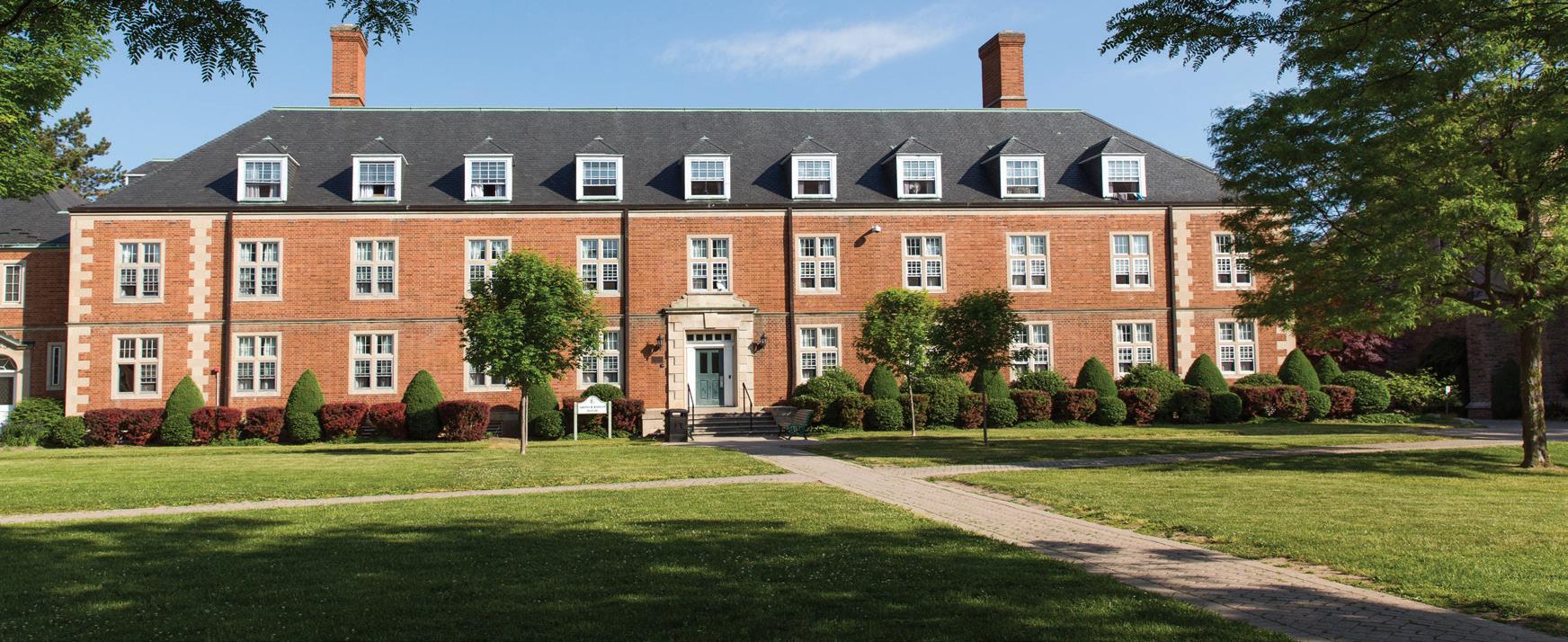
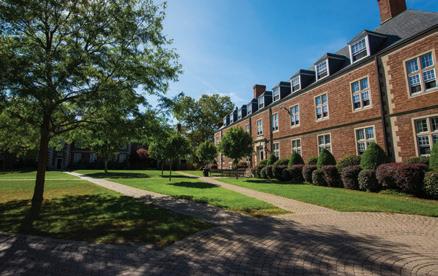
3) Members of the meeting must undertake the task of establishing such a school as soon as possible.
4) Pragmatic steps must be taken to establish the school.
5) A joint stock should be created with a capital of $50,000.
In the first meeting of the provisional Board of Governors, The Reverend John Ormsby Miller was named the founder of Ridley. He was also appointed Principal at just 27 years old.
In 1990, Ridley adopted the school motto which every Ridleian knows by heart — Terar Dum Prosim — which means "May I be consumed in service.” The motto pays homage to Bishop Nicholas Ridley. Bishop Ridley was an ardent follower of Protestant theology and became a chaplain. He led a life indicative of his Christian beliefs and refused to bow his head to the Roman Catholic Church imposed by Queen Mary and her father, King Henry VII. Consequently, he was persecuted and on October 16th, 1555, he and Hugh Latimer were burned at the stake. In honour of this, Ridley College adopted its motto in 1900, claiming that the utmost aspiration of any Ridleian is to be consumed by service the way Bishop Ridley was consumed by the flames for his immovable stance.
Ridley's founding was steeped in
religious tensions and historical feuds, although a fundamental pillar of the institution at the time was religion. As the school progressed, these differences were laid aside and the aim of the school became to produce "the best features of the best English schools,” according to Headmaster Miller.
Ridley was part of a revolution of English public schools that appeared in Canada in the nineteenth century. Several schools, including Upper Canada College, Trinity College and St. Andrew's College, shared similar values — they were all boys' schools, fond of sports and the instilment of behaviour that constituted a love of sports and exhibition of refined behaviour. Although they were called public schools, they provided rigorous programmes and were very much private in their caste and socio-economic status, indicative of the times. Boys that attended in the early days typically studied law, medicine, and politics, or simply got a preliminary education before joining the army. These boys created the prestigious and exclusive community of leaders called the Old Boy Network.
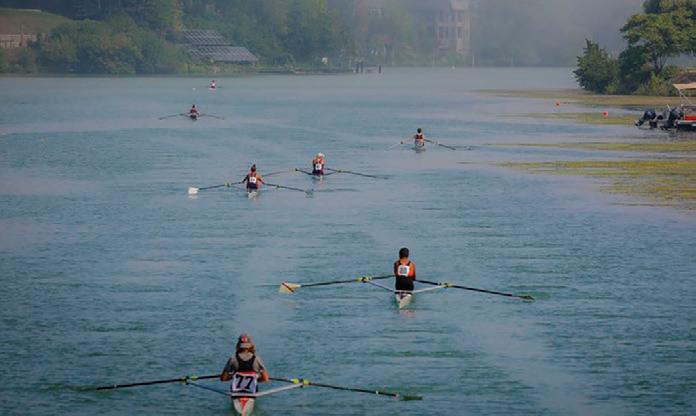
Very early on in Ridley's history, a huge emphasis was placed on sports and the importance of integrating physical activity into the education of children — much like today. Not only because this was a healthy pastime but because it fostered these same characteristics of decorum, sportsmanship and good character that Ridley sought to breed in its students. The school initially became known for cricket and football, with schools like Upper Canada College, St. Andrew's College and Trinity College as its rivals, and as the years progressed, the students continued to excel in sport. In particular, the Ridley football team won more games and gained a formidable status among other schools. However, numerous problems were preventing the original Ridley students from truly enjoying a team sports experience. One was the school's small population, which prevented variety in the choice of sports. For example, basketball, lacrosse and hockey were all played at the time but were not encouraged or heavily aided by the school because of the small numbers of students that were interested in them.
It's hard to believe there was a time when hockey wasn't always as popular as it is now, especially when you consider how integral it is to Ridley's culture and school spirit today. Once upon a time, however, the sport was struggling and was resigned to the backburner of the Ridley sports programme. Not only was hockey not considered one of Ridley's major sports, but when a small hockey team was finally established, the school had no contenders, as high school hockey in the 1890s was minuscule compared to today — mostly because it was dangerous. Players weren't armed with the protective gear they have today. Boys in those days had to love the sport to take the risk of bearing the bruises that accompany rough body checks and brutal falls. Goalies also were practically ambushed by a barrage of loose pucks and sometimes even stones! Finally, in 1896, Ridley had its first hockey match against Upper Canada College and lost 11-0. From this point on, they advocated for a covered rink to be free from frustrations like roaming cows poking holes in the ice, twigs, slush ice and other distractions. The team believed that with a dedicated area to practice, they would be able to play to the best of their abilities. This appeal was taken up by Mr. Frederick Nicholls, and work on the rink began in 1902.
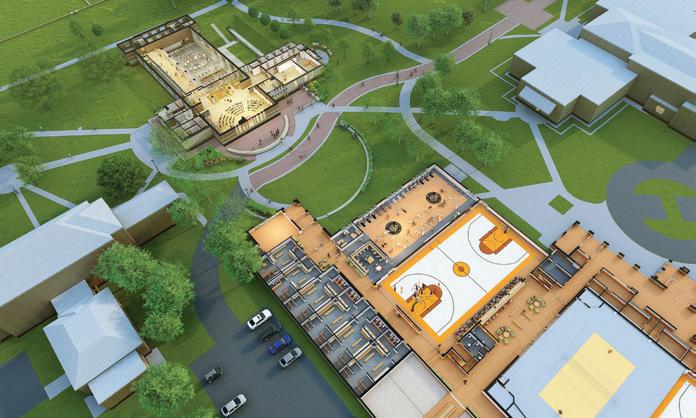
The familiar sights of the Upper School, Lower School, Second Century, and Iggulden Buildings are comforts to Ridleians one and all who hold such dear memories for each of them. It is difficult to imagine Ridley College without them. However, this was certainly the case on a dark Sunday morning in October 1903. On the dawn of that windy day, the school building, so dear to Ridleians at the time, literally went up in flames. Thankfully, there were no injuries, and all the boys were accounted for; however, in the interim, the boys had to be sent to their homes and later to Stephenson House in St. Catharines to live and study. Gradually, the buildings we know and love today were constructed: School House was completed in 1904, Dean’s House in 1907, the Lower School in 1927, and Arthur Bishop House in 1965, to name a few. As time went by, pastures and trees were replaced by granite roads and towering modern constructions.
There are many other significant historical moments omitted from this article for lack of words. Ridley's story is too rich and too profound to summarise in just a few words. It's everywhere. Everything from the campus to the people are filled to brim with an abundance of memories that propel our school further forward into the future. There is a wealth of knowledge in every picture hung up on the walls, in every beautiful stained glass window flooding light into the Chapel, and in every inscription on the back of our seats in the dining hall. Ridley is full of history. I encourage you to research more on Ridley's history and what it means to be a true Ridleian. Every Ridleian should know the stories of the campus we walk and the people who trod it before us because, in time, their footprints will become ours; their dreams and passions ignited in us. We must preserve our communal identity, ensuring that their legacies transcend generations, prolonged by our willing hearts.
This season, the entrepreneurial spirit of our alumni is on full display. These five individuals, scattered across the globe, are making a tremendous impact on the world, showcasing their remarkable ingenuity, creativity and zeal in everything they do. We caught up with these alumni who shared their extraordinary passion, contagious enthusiasm, and sage-like wisdom— as well as their shared love for Ridley College.
Leveraging the power of digital communication, Robert and his team at First Session are revolutionizing the way that Canadians access therapy. In only three short years, the startup has helped over five thousand Canadians find and connect with mental health professionals, with plans to support thousands more in the coming decades.
In any given year, 20 per cent of Canadians experience mental illness. By the age of 40, 50 per cent of Canadians will experience some form of mental illness. In recent years, this number has been compounded by the COVID-19 pandemic, with fewer Canadians reporting having excellent or very good mental health — 55 per cent in July 2020 down from 68 per cent in 2019.
The costs associated with this ongoing crisis are staggering, with the annual economic cost of mental illness in Canada—including health care costs, lost productivity, and health-related quality of life reductions—estimated at over $50 billion a year, according to statistics from the Centre for Addition and Mental Health (CAMH).
But there is light in the darkness. Increased visibility through national awareness campaigns like Bell Let’s Talk, along with significant financial investment by the federal government to support increased access to services, has placed mental health top of mind in our national consciousness. In education, schools have made major strides in promoting mental and physical wellbeing and identifying and facilitating mental health treatments for children and youth, while at work, many employers have shifted their focus to creating healthy and sustainable work cultures and expanding access to mental health supports and wellness programmes for their employees.
Recent advances in communication technology— along with increased awareness of mental health and mental illness and, for better or worse, the COVID-19 pandemic—have transformed the way that people around the globe access mental health services. Ridley alumnus and entrepreneur Robert Pintwala ’08 has been a major innovator and force for change within this space. For the last three years, he has been the owner and chief operator of a startup that has helped more than five thousand Canadians find and connect with mental health professionals. And, as the company continues its nationwide expansion, he is poised to help thousands more in the future.
In May 2019, Rob launched First Session, an online mental health platform designed to help simplify the process of finding a therapist, in order to eliminate barriers to accessing mental health services and empower individuals to seek out—and stick out— the course of treatment. The platform allows users to compare hundreds of practitioners by province, specialization, and modality of treatment, and book sessions instantly, while also providing an array of mental health resources to help individuals navigate challenges and obstacles related to therapy.

Fundamental to their approach is the insight that the client-therapist relationship is the number one indicator of success in therapy. “That’s entirely what
we're focused on,” Rob says. “We put a lot of effort into vetting our therapists and showcasing them authentically, so people can get the information they need to go ahead and take that first step when they’re ready.” While all too often, individuals are shuffled impersonally through the intake process, only to be passed along to a therapist who is not right for them, First Session, in contrast, aims to place the power back into the hands of individuals, “much like a dating site,” he notes, by allowing users to “browse their options and get a sense for who the professional is before making any sort of commitment.”
One of the key ways that they accomplish this is through the use of short introduction videos, which are designed to help users get a feel for a particular practitioner before making a decision. “Each therapist has a professionally produced video that showcases their approach and personality, allowing users to assess fit based on their gut feeling after watching it,” he explains.
While COVID-19 pandemic has had drastic, widereaching effects on Canadians’ mental health, it has also brought mental health to the forefront and revealed some of the challenges masked by the regular goings-on of everyday life. “[COVID-19] also helped to normalize the video call,” he notes. “As people got used to using platforms like Zoom, more were willing to try
online therapy,” which, he admits, gave First Session a big push.
“When I initially started, I was not thinking about online therapy. I built the directory for in-person therapy by drawing a map of Toronto and seeing how many clinics fell within a particular radius. That’s how it started.” Since then, the company has expanded to provide access to a whole host of mental health services, both in person and online, and Rob hopes to continue expanding into new markets.
For Rob, First Session is both a career and a passion project. Since its inception, the company has been entirely self-funded, which he claims has made him much more disciplined in his approach to growing the business. But it was his personal mental health challenges—and the challenges of those around him—that ultimately compelled him to take the risk.
Reflecting on his impressive journey, he expresses fond memories of his years at Ridley College, where he kept himself busy with a surfeit of activities. Following in the footsteps of his two older brothers, Ed ’01 and Justin ’03, Rob came to the school in 2005 determined to live up to their accomplishments and get himself into a top university. And that he did—serving as a Prefect in Merritt North, captain of the hockey, lacrosse, and football teams, and Cadet Lieutenant Colonel and Commanding Officer of Cadets before departing for McGill University to study Finance and Entrepreneurship. But when he arrived at university, it was a whole new world.
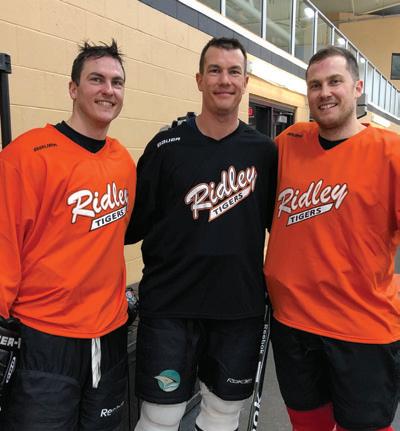
“I kept myself so busy at Ridley. At that age, you don’t feel like you
need as much rest,” he reflects. “I really dug into the community and the service culture and tried to do the best I could in school and contribute on the sports field and in the hockey rink. But when I got to university, I had more free time and had to sit with myself, and that kind of caught up with me.”
from those around him along the way. “My internships taught me how to solve problems in a very unconventional way,” he explains.
“I thought of business as stuffy and corporate, but the startups were really new age to me, very exciting and very fast without a lot of red tape, which I really liked.”
Shortly after, he left Toronto for Vancouver, taking a sales position at a bookkeeping software company in Vancouver and working his way up the ladder.
This unprecedented level of free time, coupled with his parents’ separation during his final year at Ridley, he says caused him to fall into a prolonged depression. At the same time, he developed a keen interest in the inner workings of human psychology. “I didn’t major or minor in psychology, but I wanted to understand human thought processes and emotions,” he recalls, and began promptly filling the holes in his timetable with psychology courses. But he could not yet anticipate the path where this would lead him.
After studying abroad in Prague and Shanghai, he landed several high-profile internships at a number of tech startups in Toronto, including a brief stint at Uber shortly after they expanded into the Canadian market. Feeling refreshed by the dynamism and freedom that these roles afforded him, he fully leaned into the startup culture, gleaning as much knowledge as he could
Fearing that he was approaching a ceiling within the company, he returned to Toronto to join another startup. It was around this time that his girlfriend, now wife, Shannon, discovered that her father was terminally ill. However, when she sought out a therapist to help her process her grief, she was treated coldly, without empathy, and passed onto a therapist who was not a good fit for her. “She immediately felt like she was being sold to, so she backed away and never went back,” he laments. “After that experience, she felt like therapy was not for her.” Then, just when things couldn’t get any worse, after six months on the job, he was fired.
“It took me getting fired to actually take a risk,” he confesses. After watching Shannon being pushed through the assembly line of treatment, he began speaking to others who’d had similar experiences. “I realized that so many people who try to seek help are left disappointed. 30% of people who try therapy once don’t return for a second session.” Shortly after, he went to work on First Session.
From inception, Rob has been laser-focused on intervening at the decisive moment that an individual decides to seek
treatment. “It’s a very delicate time, and we are determined to make that experience more human, more seamless and frictionless, while also ensuring that the individual can go at their own pace and make their own choices. And having that safety and trust and rapport between you and your therapist makes all the difference, more than all the variables—the modality of therapy or all these other little things,” he says, assertively.
Today, First Session works with over a hundred mental health professionals nationwide, but they are very selective with which professionals they are willing to work. In Ontario, for example, the company works exclusively with members of the three major colleges—the College of Registered Psychotherapists of Ontario, the Ontario College of Social Workers and Social Service Workers, and the College of Psychologists of Ontario. In less regulated territories like British Columbia, they defer to the different self-governing associations in those domains.
“Some [organizations] are more recognized by insurance companies, so we try to handpick
from the most reputable ones," Rob explains. “We won’t work with life coaches or people who are not designated by the governing bodies, and there have been circumstances where we’ve denied people use of the platform.”

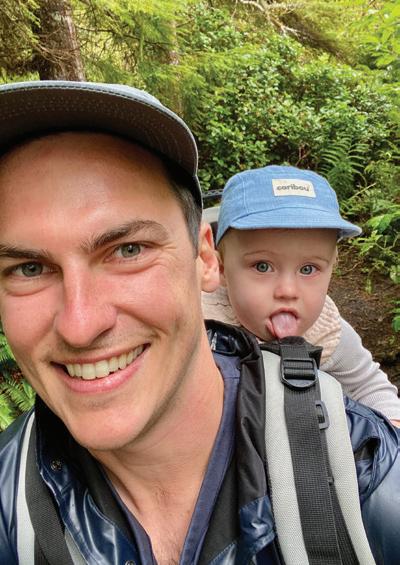

When it comes to the contours of the platform itself, he credits his dual experiences in sales and tech. “Working with web and UX designers at the tech companies really rubbed off on me just in trying to make a really nice software product. And having been in sales, I spent so much time talking to customers and trying to determine the bumps in the road in the process of finding a therapist and what they wish was better about the process,” he says.
Speculating about the future of the company, he says that he would like to continue to refine his business model so that he can begin to raise external capital. “The project has been self-funded to date. My previous roles in the field were with venturebacked companies with larger budgets,” he confesses, “but I think if I make a few tweaks, I could raise the capital to really expand nationally and gain market
share.” Additionally, he says that he would like to work with more B2B organizations and integrate directly with the insurance providers so they can continue to improve the client experience.
When asked what advice he has for young Ridleians, he advocates thinking outside the box, emphasizing that the career pathways many students believe are available to them are only a small percentage of the opportunities out there for intelligent, creative young professionals who are willing to work hard.
“It’s really easy to be led down the path of a traditional corporate career, but the jobs that are on the job boards and the companies that come to the schools are only a fraction of the jobs and the companies that actually exist, so make sure you are building connections, asking the connections you have for introductions, and discovering what’s out there. You’re not going to figure out what you want to do right away. It took me a long time to get to this point. Don’t be afraid of failure and remember—any experience is good experience.”
What is entrepreneurship? A simple definition may immediately spring to mind, but like most things, it is significantly more complex and slippery than we initially imagine. In these unprecedented times, however, this question is an essential one, and one that is frequently pondered by the future leaders and changemakers of the world — those who are actively invested in creating a better, more equitable and more inhabitable place for all.
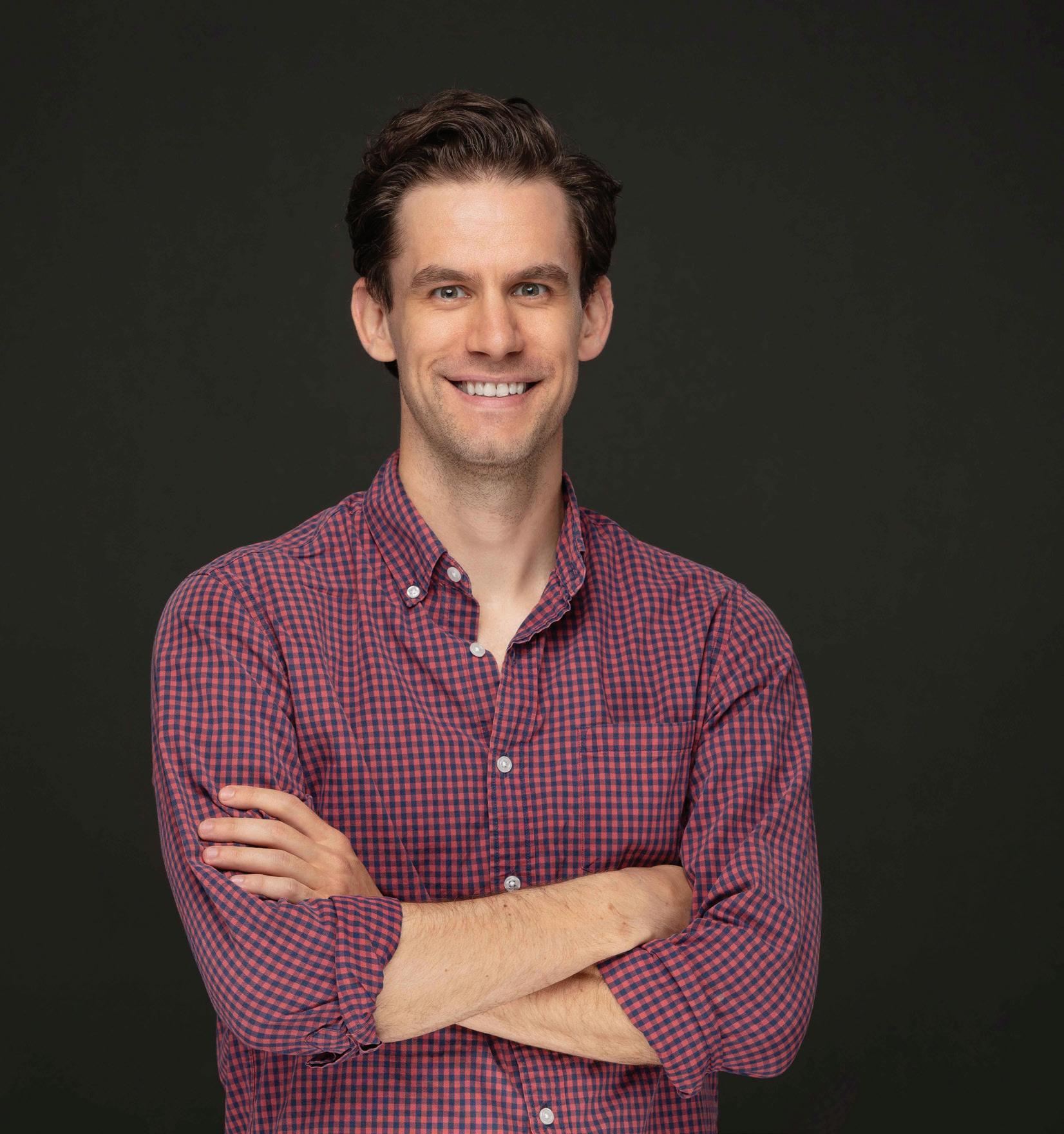
Ridley alumnus Nathaniel Houghton ’07 has thought intimately about this question and its manifold dimensions. More than simply the act of starting and running a business, he has demonstrated through his remarkable work that it is, in fact, much more than that — it is a belief in one’s ability to change the world and a willingness to act on that belief.
Since 2010, Nate has split his time between business and philanthropic endeavours as the founder of the charitable organization, Congo Leadership Initiative (CLI), as well as co-founder of the independent advisory and consulting firm, Incendium Strategies. Catching up with Nate this summer, he explained how both activities fall under the purview of entrepreneurship and shared his passion and tremendous insight on a host of topics, as well as fond memories of his time at Ridley College.
Nate came to Ridley College in his Grade 11 year in the fall of 2005 and attended until he graduated in the spring of 2007. Despite his brief tenure at the school, he proved himself to be a man of many talents, getting involved in a spectrum of activities. Reflecting upon his experience, he did not mince words. “I loved it,” he continues. “I played soccer, hockey, and rugby, I was on the debate team, and I played in the jazz band. I was a Prefect in Arthur Bishop West. Overall, it was a great experience for me.”
In 2007, he, along with his fellow Ridleians, went to the World Individual Debating and Public Speaking Championships in South Africa. This experience, along with his Ridley experience more generally, he credits with helping to develop his commitment to service work, cementing the foundations of his social consciousness and directing him on the path that he would take later in life.
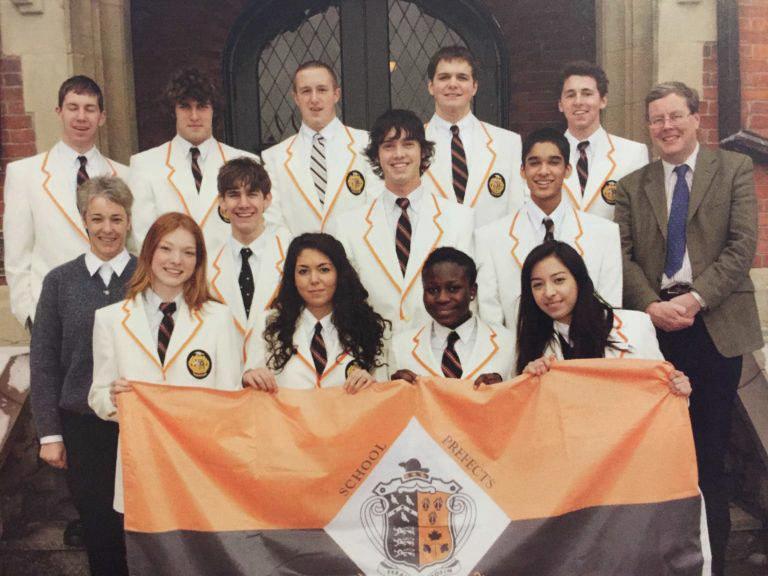
“Reading and learning about different ways that various thinkers have looked at the world forced me to think more about what I was doing for the world around me, which really started for me in my Grade 12 year,” he reflects. “This is not to say I was unaware before, but this is when my ideas really began to take shape and influenced the decisions I made afterwards.”
After graduating from Ridley in 2007, he attended Cornell University where he studied Policy Analysis and Management, and later, would go on to complete his MBA at Harvard Business School.
While at Cornell, he was involved in a plethora of extracurricular activities, doing community service work with the United Way and other organizations, and joining a fraternity. During his second year of undergraduate studies, he ventured to the Democratic Republic of the Congo for the first time.
“I became cognizant of the idea that if I wanted to see something, I should go and see it,” he says assuredly. During this inaugural visit in 2009, he found himself taken with the country and its incredibly complex and tumultuous history. “It’s an incredible place. It’s a huge country with an unbelievably unique and tragic history. But there is so much untapped potential,” he continues. It was during this trip that he would also meet his future business partner, Robert Kumkum, and upon his return to the United States, he began to imagine the ways that he could be a catalyst for change in the region.
In 2010, he, along with Kumkum and Emmanuel Baraka, launched the Congo Leadership Initiative with a single, week-long workshop which was delivered to eight girls and eight boys in Kinshasa. Twelve years later, the organization has provided ethical leadership training to over 6,000 individuals in the country and provided support for a number of community initiatives and small business projects.
“We are focused on leadership and entrepreneurship training for young people. Our programmes are led by local leaders and organizations, and we are not prescriptive about development models,” he explains. “We collaborate on the curriculum, and we share responsibility for the programme itself, but ultimately, it’s about communicating the value of entrepreneurial thinking.”
More than the act of starting and running businesses or producing strictly economic outcomes, Nate conceives of entrepreneurship in a wider sense, that is, as a philosophy of self-actualization and a belief in the ability to influence the world around you. “People have agency, and we all have the capacity to change our own reality. This is something we sometimes forget, but whether in the Congo or at home, there are certain skills and beliefs that allow us to change the immediate environment that we exist within, in a way that fits with our own interests and skill sets,” he imparts.
The goal of the organization, he explains, is to shape the mentality and outlook of individuals, as well as equip them with the tangible skills needed to meaningfully intervene in their home communities. Therefore, their programming is specifically focused on addressing the challenges that have historically inhibited development in the DR Congo and imparting the skills needed to propel the country forward. This is a novel approach, and one which he suggests is sorely lacking in many charitable endeavours. Putting it straightforwardly, he claims “we need to get out of the way.”
While measuring outcomes can sometimes be difficult, the initiative has produced a number of incredible success stories which demonstrate the more nuanced ways that ethical leadership can positively affect communities. Many of their alumni have gone on to effect positive change in their communities and the country at large, becoming doctors and lawyers, or successful entrepreneurs, and some have even won election to public office, a point in which Nate takes a great deal of pride.
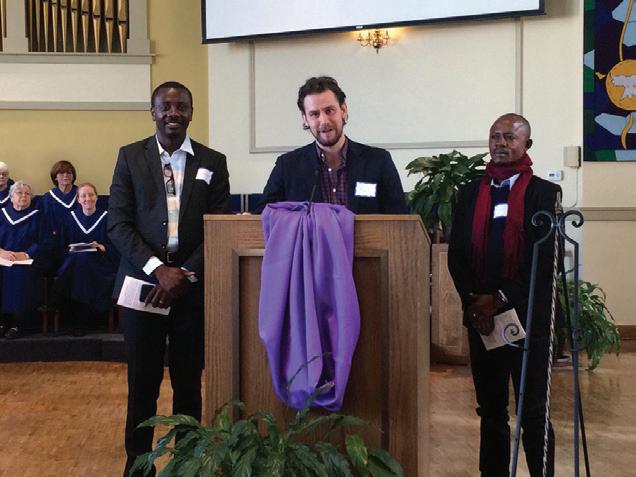
In addition to his duties with the initiative, Nate also collaboratively runs Incendium Strategies, an independent marketing and consulting firm that works with tech companies and startups, which he claims takes up most of his time these days. “I spend about 80% of my time on my day job, but I get more out of having different things going on,” he explains. “I enjoy having different possibilities and interacting with all kinds of people, and I think it serves me better to do both. If I had all the money in the world, I’d probably be doing just what I’m doing.”
When asked what the future holds, he quips with a smirk, “Goal setting is overrated!” And students, he claims, would be wise to heed this advice. While

this may initially sound controversial, he is merely suggesting that we can benefit immensely from going with the flow of things and remaining open to the opportunities that present themselves.
“It's often more useful to let things happen than to tie ourselves to specific objectives that may or may not be what we want to attain any longer. If we index too tightly on goals that we set a long time ago, we end up going in a direction that we're not interested in anymore,” he concludes.
If you sourced clean water from a tap in Ontario today, chances are, you have Ridley College alumnus Perry Nitsopoulos ’95, along with his business partners and fellow Ridley parents, Michael and Steven Massis, to thank for it. For more than a decade, the Nitsopoulos-Massis clan has been the driving force behind the Continental Carbon Group, a Hamilton-based turn-key solutions provider that has been continually breaking ground in the air and water treatment industry — a marvellous feat that includes treating 98% of the drinking water that flows from taps in the province of Ontario.
While many companies continue to integrate sustainability into their day-to-day operations, their business, quite literally, is sustainability, that is, keeping the air, water and land on which we work, live and subsist healthy, inhabitable and clean. The company supports a whole host of North American industries, providing its customers with cutting-edge solutions in the key areas of water and wastewater treatment and activated carbon odour control systems.
Speaking with Perry and Mike earlier this year, they explained how they got started in this endlessly fascinating industry, as well as their deep connection to Ridley College.

As a first-generation Ridleian, Perry understands the value of a Ridley education and is proud to send his children to the school. His children, Christian ’22 and Jeneva ’21, are recent graduates of the school, while his son, Nathan ’29, is going into Grade 6 this year. As a student, Perry has fond memories of playing sports— soccer, squash, cricket, and swimming—and reflects on the deep bonds of friendship that he formed during his time at the school.
“The friendships you make at Ridley last forever. There’s a legacy there, a brotherhood. You know that you can call up any of these friends from all around the world and even if you’ve not been in contact for a long time, you always feel a special bond,” he says meditatively. “Once a Tiger, always a Tiger, right?”
Likewise, Mike has two children currently enrolled, Loukas ’24 and Isabella ’26. And while Mike is not an alumnus, he claims his experience as a parent at the school has been fantastic. “Our kids have been blessed with the opportunity to be educated and enriched in such a tradition, to learn from faculty with a tremendous amount of experience, and to be around a diverse gathering of students,” he says. “I think it’s second to none. It’s been a great experience for our family.”
Continental Carbon Group is not the first joint venture between the trio. From 2000 to 2009, Perry and the Massis brothers helmed an international startup called Global Pro, which specialized in the manufacturing and distribution of packaging materials for steel, lumber, and other industrial goods. With facilities in
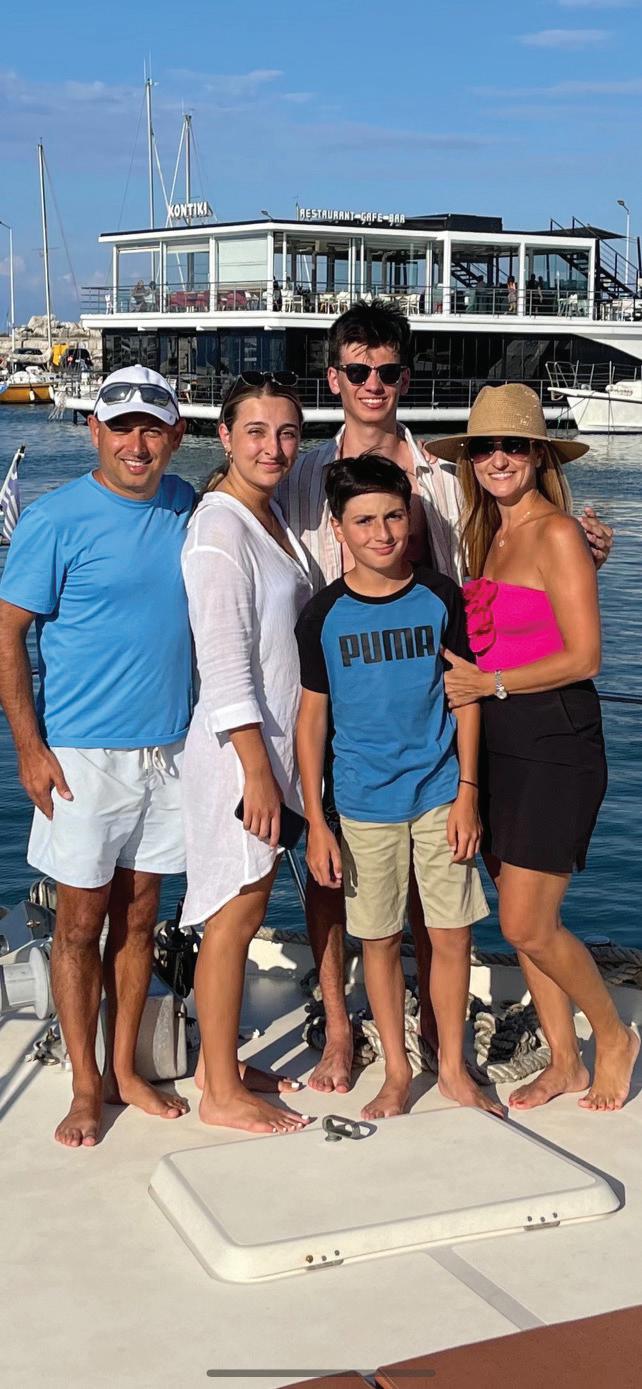
the Niagara Region, Nashville, Tennessee, and Slovakia, the company supplied high-profile customers across North America and Europe with innovative, corrosionresistant packaging solutions that allowed them to safely ship their products across long distances.
“Let’s say a piece of steel left Canada in the middle of winter and got shipped to Ford in Mexico,” Mike explains. “That steel would condense, but an active chemical ingredient in the packaging would prevent it from corroding.”
But after nearly a decade in business, the men found themselves travelling excessively and longing to spend more time with their young children, motivating them to sell the business to an American conglomerate. After a brief period of much-needed rest and rejuvenation, they began seeking out new ventures, waiting for the right opportunity to come along, which it did in the form of another American company the trio promptly acquired and expanded into the prolific and robust Continental Carbon Group of today.
“We took six to eight months off after and did some travelling, spending time with the kids, but we quickly realized that we couldn’t just stay home and put our feet up,” Mike explains. “We realized that we really wanted to be in this space, and six months later, Continental Carbon was born.”
Playing to their strengths, the three have grown their business significantly over the past decade, assembling an exceptional team of chemical, civil, and mechanical engineers, among other professionals, to develop innovative new technologies and marshal the resources and expertise to make our planet a healthier, safer, and more inhabitable place.
“We’re not inventors,” Perry confesses. “We’re very good at taking what's out there and building a better mousetrap. We're really strong at marketing, getting to the customer and making sure that the customer is first and servicing the customer
like no other. That’s the attitude you have to take as an entrepreneur,” he says authoritatively.
The company is comprised of three divisions: air filtration, water filtration, and soil remediation. Additionally, all of the technology needed to carry out their multitude of activities is designed and built inhouse. Among the most significant of these activities is water treatment, which, as mentioned above, includes treating 98% of Ontario’s drinking water. But more than simply purifying the water, Continental Carbon’s intricate filtration technology enables municipalities to optimize both their filtration processes and their water output.
“We’re the last stage before it goes to your tap,” Mike explains. “And our technology allows water plants to produce double, sometimes triple, the amount of water they’ve been producing with older technology. It’s not just a matter of cleaner drinking water but of more efficient delivery to your tap.”
While the pair could not have anticipated that they would find themselves in their current industry, their passion for their work and for the environment is palpable, and they strive to strike a balance between the two initiatives in their operations. “Water is more important than any other resource. We need it for human survival. That’s the driving force, knowing that we’re doing good for the environment and for people, but at the same time, we also know that the business is sustainable with a lot of growth potential,” says Mike.
At the moment, the company is also engaged in a series of high-profile air and soil remediation projects, among them, Toronto’s Port Lands project, which seeks to transform the city’s former industrial sites into healthy and productive green spaces. “It’s actually the largest cleanup site in Canada,” Mike explains. “A lot of downtown Toronto was heavily industrial, and there were fewer regulations [years ago], so companies were dumping contaminated water right into the soil.”
Don’t be afraid to get your hands dirty. Get experience on the ground floor or the job site, wherever the meat and potatoes of that business is. It sounds cliché, but be patient and work hard, unless you have some amazing idea that Apple or Tesla want to buy.
In the coming years, Continental Carbon is poised to play a significant role in extracting a deluge of contaminated water that has been dumped into the soil over the last two centuries, which will make these sites safe hubs for human activity and help to facilitate the redevelopment of the city’s waterfront. The group will also play a role in the dredging of the Hamilton harbour—a project that has received federal, provincial, and municipal support and funding—by removing the sediment that has been polluted by heavy industry over the years.
The company’s third branch of operations involves air treatment. One of the most common activities in this realm, Perry says, is the removal of hydrogen sulphide (also known as H2S) from the atmosphere. “We know it as H2S, but most people would describe it as a ‘rotten egg smell,’ the kind you often find near a pump station or factory. We treat that odour so that it doesn’t become a nuisance to the population.”
Additionally, the company has an ongoing contract with Toronto Pearson Airport to filter jet fumes using their specially engineered air handling system. “We have four or five different designs in all different sizes, but basically, it forces the air through an activated carbon bed, whereby it becomes purified and is reintroduced back into the atmosphere,” Mike explains.
As a growth-oriented company which has grown at an exponential rate over the last decade, the pair naturally has their eyes set on the future. At the moment, they are in the process of two acquisitions which are slated


to close in the next few months, but long term, they are focused on the two filtration markets that are going to emerge in Canada: the removal of iron manganese and perfluoroalkyl and polyfluoroalkyl substances (PFAS) contaminants.
“There’s going to be all kinds of federal money for these initiatives, and companies like 3M and DuPont will be assisting with the clean-up as well,” Mike explains. “Activated carbon is one of the best, most economical ways to get rid of these compounds, and our technology will play a significant role in helping to clean up those sites,” Perry adds.
When asked their advice to young Ridleians, the pair does not mince words.
“Get educated and go start a business!” Perry exclaims. “We need more entrepreneurship in Canada,” he continues. “And having a base of knowledge, whether in business or engineering, really anything you can specialize in, is extremely valuable. And then after that, just go and start something,” he concludes, decisively. “Nothing beats the feeling of building a business from scratch!”
“Young entrepreneurs should be prepared to do whatever it takes to become successful,” Mike adds. “Don’t be afraid to get your hands dirty. Get experience on the ground floor or the job site, wherever the meat and potatoes of that business is. It sounds cliché, but be patient and work hard, unless you have some amazing idea that Apple or Tesla want to buy,” he laughs.
Share a few short words with your fellow Old Ridleians about important milestones, career moves or philanthropic endeavours. Please include your full name and the year you graduated from Ridley.
High resolution images (300dpi, 2MB minimum) are welcome to accompany your Class Note.
SEND TO: development@ridleycollege.com
Ian Wood '53 and his wife Barbara celebrated their 65th wedding anniversary on August 31st, 2022. They were visited by Headmaster, Ed Kidd and Director of Wellbeing, Hanna Kidd at their vacation property in Switzerland this summer.
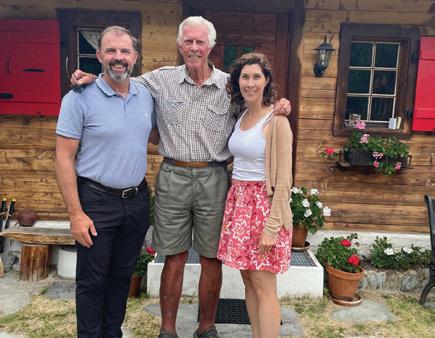
Tom Richardson '58, who passed away in January 2021, had a memorial fountain installed at the Piper's Landing Golf Community in Florida in the spring of 2022.

David Worts ‘66 received a Japanese Imperial decoration—The Order of the Rising Sun, Gold Rays with Neck Ribbon—from the Government of Japan in August 2021. This distinction comes in recognition of his contributions toward strengthening Japan-Canada economic relations over many years.
Marshall Soules ’67 was awarded the Marshall McLuhan Award for Outstanding Book in the Field of Media Ecology by the Media Ecology Association, along with his co-author B.W. Powe, in July 2021. The Charge in the Global Membrane, published by NeoPoiesis Press in 2019, explores the impact of global technologies and communication networks and features text by Powe and images by Marshall.
John Dinner ‘77 has joined the Delton Glebe Counselling Centre in Waterloo, ON after completing a Masters of Spiritual Care and Psychotherapy at Wilfrid Laurier University. John will be a practicing psychotherapist on a part-time basis in addition to his corporate governance consulting work.
Don McDonald '80 competed in the Subaru Ironman Canada in Penticton on August 28th. He took second place at the 1984 event, and is currently ranked 39th overall in the Ironman Men's 60-64 age group.
Lyle Himebaugh '82, Partner at Granite Group Advisors, did an interview with Bloomberg about the current state of the markets in 2022.
Scott Steele ’85 was recently profiled in an issue of Leaside Life. After years of painting on the side, he is pursuing a full-time career as an artist, working from his home studio in the Toronto Annex. His work is on view and available for purchase at Art Interiors on Spadina Road in Toronto.
Michele-Elise Burnett '86 organized an immersive exhibition, The Red Dress Exhibit: If Only These Dresses Could Tell Their Story, as part of the Celebration of Nations at the FirstOntario Performing Arts Centre in St. Catharines this September.
Wendy O'Brien ‘88 took home the award for Outstanding Casting for a Comedy Series at the 2022 Creative Arts Emmy Awards. The award, her second, comes as the result of her outstanding work on the ABC series, Abbott Elementary
Derek Power '89 has produced a piece of art for sale in support of Ukraine. Prints of Ukrainian Flower are available for sale through his LinkedIn page and 100% of the profits have been donated to the Canada-Ukraine Foundation. After selling more than 20 prints in the first five days, he is currently preparing a second run of 50 prints.
Aaron Yarmoshuk '89, Saurabh Sharma '89 and Derek Vesey '89 made it back to St. Catharines for the CSSRA Championships on June 5, 2022.
Lana Young '89 starred as Ethel in Tyler Perry’s new film, A Jazzman's Blues, produced by Netflix. The film premiered at the Toronto International Film Festival (TIFF) in September 2022, where Lana gave a big shoutout to Ridley College on the red carpet!
Alexander "Sandy" Rasmussen ’07 held his second solo art show, Can't hit a moving target, at the Christopher Cutts Gallery in Toronto from March 12th to April 16th.
Laura Court '14 participated in the Rowing World Championships in Munich, Germany this September, serving as coxswain for the Canadian Men’s eight team.
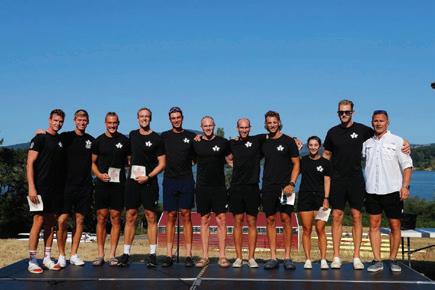
Shamar Burrows '16 was named an Atlantic University Sport (AUS) basketball second-team all-star for the 2021—2022 season. He was third in scoring for the Dalhousie Tigers, averaging 14.8 points per game in 13 games, shooting 73.3%. He also led the Tigers in rebounding with 6.7 per game.
Ben Johnson '17 received the Spirit of Brock medal in June for his leadership, courage and dedication to improving the Brock University community.
Heather Rhind and her husband, Pete, welcomed their baby boy on March 5, 2022, weighing 8.2 lbs.
Hilary (Whitty) Leveille ‘09 and her husband, Daultan, welcomed their second baby girl, Skylar Anne Leveille, born on July 23, 2022.
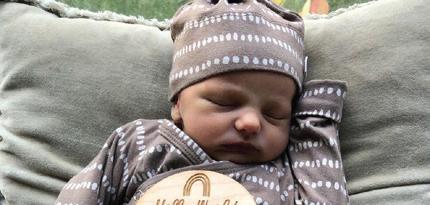


Carla Anzit and her husband, Christopher Vizzari were married on March 12, 2022, in Niagara-onthe-Lake.


David and Jess Zanic were delighted to welcome Ariana Aurora Zanic, born on April 2, 2022, weighing 8.11 lbs.

Andrew and Chelsea Hitchcox were married on June 30, 2022, in Vineland, Ontario.
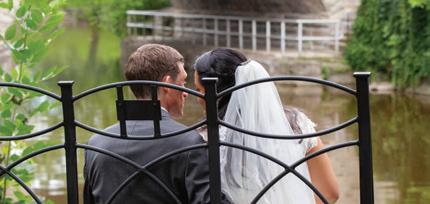
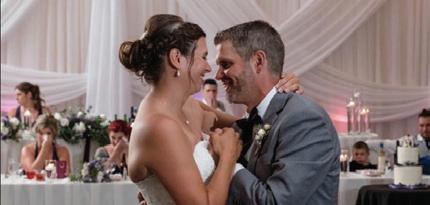
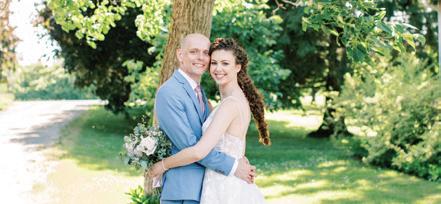
Khatol Sahak and Evan Kingma welcomed their son, Khalid Wybren Kingma, born on August 24, 2022, weighing 8.12 lbs.

Joel Whitty ’08 and Stefanie Dollak ’08 were married on September 17, 2022, in Ancaster, Ontario.
Celeste
Andrea and Dan Lane welcomed their daughter, Ivy Belle Whistler Lane, born on September 15, 2022, weighing 7.12 lbs.
Karley Bell and her husband, Mike, welcomed a healthy baby girl, Oakley Anne Bell, born on October 5, 2022, weighing 7 lbs.

After more than 55 years of dedicated service, Mike Moulden ’70 retired in June 2022.

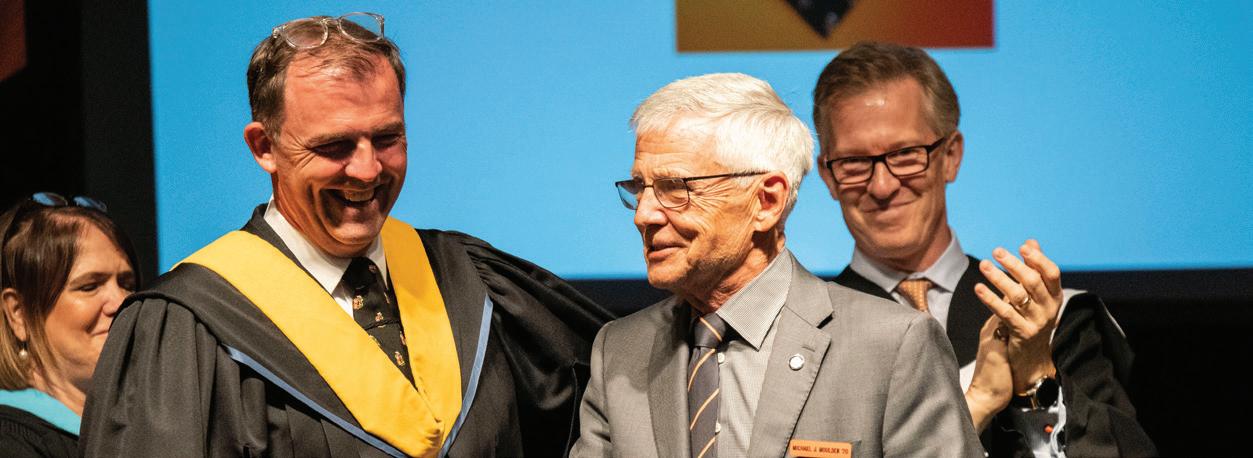
As an alumnus and graduate of the Class of 1970, Mike has served the Ridley community for more than five decades. Before graciously coming out of retirement to join our staff in 2004, Mike held several prominent volunteer positions with the school, including serving as President of the Ridley College Association and Chairman of the Ridley Fund. He also sat on the Ridley College Board of Governors for 12 years where he was a member of the Standing Committees on Property and Advancement.
In his role as Senior Development Officer and Planned Giving Manager, Mike embodied Ridley’s values of
Gordon Jarvis '39 died August 7, 2022, at age 100.
John “Sandy” Boyd ‘46 died July 2022, at age 93.
Henry “Don” Williams ‘48 died March 25, 2022, at age 91.
John Walton ‘49 died May 28, 2022, at age 91.
Rodger Dusing ’51 died April 10, 2022 at age 90.
David Bowes ‘53 died May 13, 2022, at age 88.
Jonathan Swinchatt ‘54 died January 22, 2022, at age 85.
service and demonstrated a steadfast commitment to creating flourishing communities, both on campus and off. In addition to building and cultivating relationships with hundreds of alumni and parents, Mike was integral to Ridley’s Tiger Arena, Fieldhouse and 125 Renaissance campaigns, and worked closely with the Class of ’68 to support their bursary crossing the $1M mark.
As a loyal Ridleian, Mike has consistently gone above and beyond for the school, guided by a sense of meaning and pride in his work and a deep love for the Orange and Black. Many of us will remember him fondly as an early riser, arriving well before sunrise and completing half a day’s work before the rest of us even began to shuffle in. Others
will remember his epic costumes, his fastidiousness (and the pranks that ensued!) and his passion and zeal as a track and field coach and supporter of the speaking arts. His tremendous impact on developing and advancing our college and our culture would be difficult to measure and will not soon be forgotten.
While Mike will continue to be a part of the Ridley community in a volunteer capacity, he will be greatly missed day-to-day by staff, faculty, students, and alumni.
Congratulations, Mike, on your retirement, and thank you for your dedication and commitment to our community. We wish you all the best as you embark on new adventures in retirement!
Robert “Jim” Neilson ‘57 died May 26, 2022, at age 84.
T. Peter Drake ’58 died August 16, 2022, at age 83.
Phillip Martyr ‘59 died May 22, 2022, at age 82.
Derek MacGregor-Greer ‘60 died January 17, 2022, at age 79.
Frank Buck ‘62 died March 15, 2022, at age 78.
John “J.J.” Sterne ‘67 died Feb 26, 2022, at age 73.
Christopher Hall ‘79 died March 8, 2022, at age 62.
Greg Dunkley ‘84 died July 21, 2022, at age 57.
Christopher Stevens ‘87 died July 19, 2022, at age 53.
Mark Gambhir '91 died September 12, 2022, at age 50.
Connor Greenway ‘08 died May 4, 2022, at age 31.
Ayotoluwafunmi "Ayo" Agusto ‘11 died March 28, 2022, at age 28.
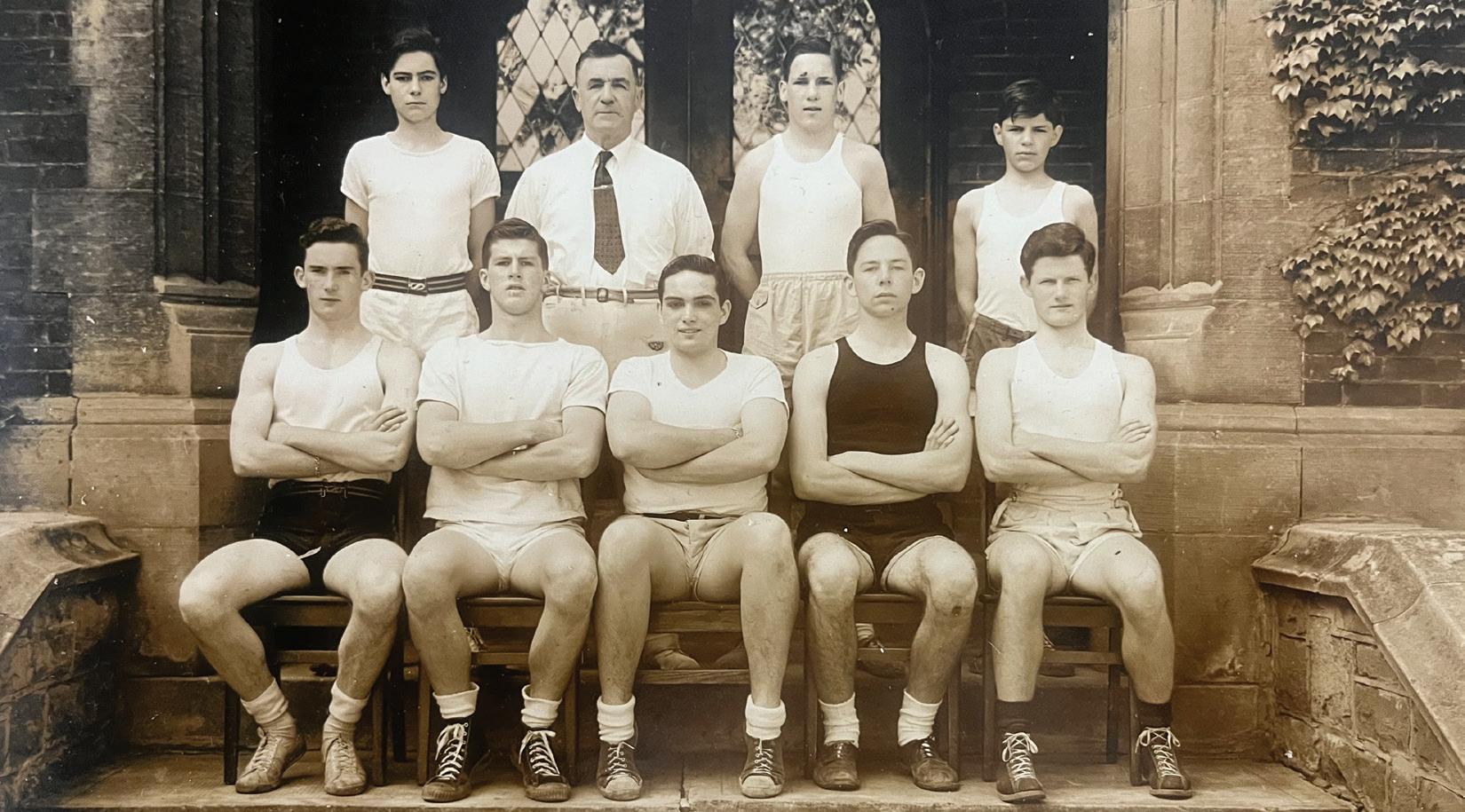 By Tyler Adair
By Tyler Adair
On March 7th, 2022, Ridley College broke ground on the Iggulden Building and Athletic Complex renovations, officially commencing The Campaign for Ridley—the largest and most ambitious construction project in our history. After four years of campaign fundraising, we are beginning a new chapter in our history, building on our impressive legacy to reshape the learning landscape for future generations of young Ridleians. By Fall 2023, this space will be thoroughly revitalized and transformed into an arts hub, fitted with a state-of-the-art Creative and Learning Commons, Music Conservatory, Concert Hall, and Art Gallery, among other features.
For decades, the Iggulden Building was the heart of athletic life on campus. To this day, its walls and floors bear traces of nearly a century of irrepressible vitality and vigorous activity. In July 2022, a relic of Ridley's athletic history was uncovered beneath the floors on the Iggulden Stage. On this spot, once upon a time, lived Ridley's regulation boxing ring, where generations of Lower School and Upper School students cordially traded barbs with their opponents, hoping to earn a spot in the school’s annual winter tournament.
While some may be too young to remember, boxing was once a fixture of Ridley’s athletic curriculum. From 1922-1983, boxing was mandatory for all Lower School students. Year after year, enthusiastic young pugilists of all ages jumped into the ring to practice “the manly art of self-defence” with delight. Many Upper School students continued to pour into the gym voluntarily even after it was no longer required of them, eager to engage in this beloved Ridley pastime, much to the surprise

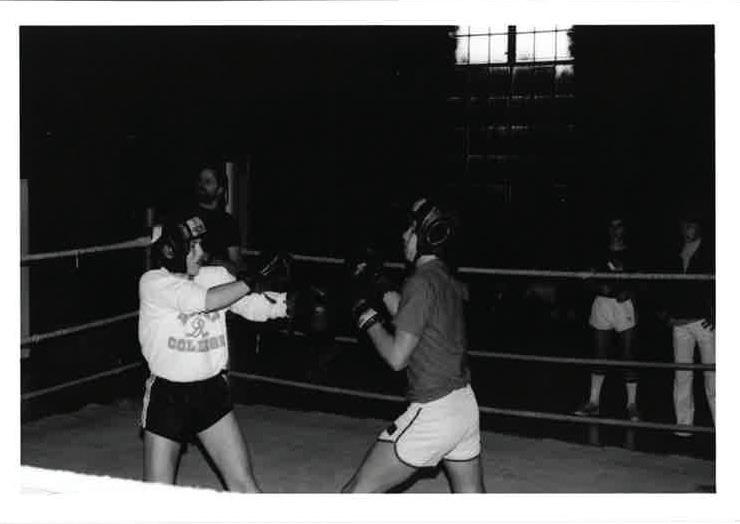
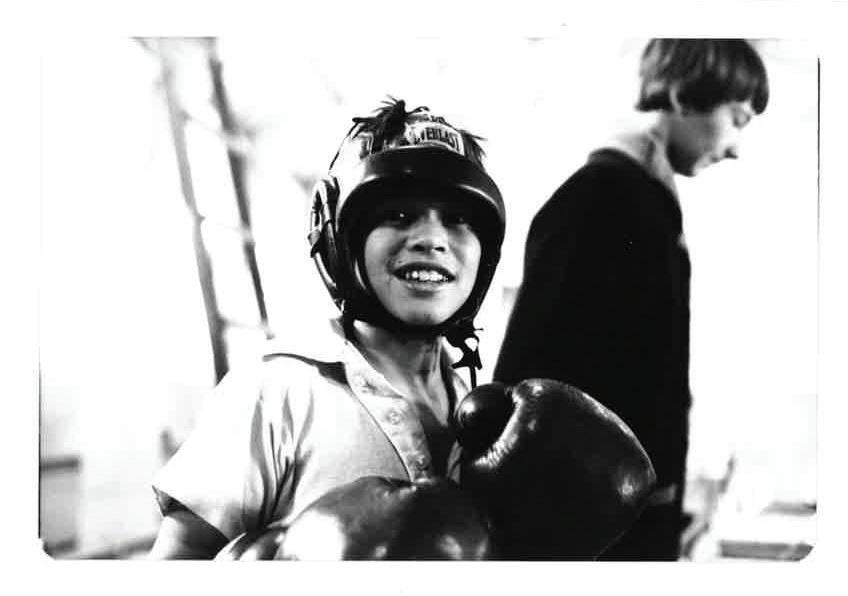
of long-time boxing coach, Sergeant Alec Alexander, who found himself overwhelmed by the sharp increase in students he had to instruct each year.
Much like the Iggy gym itself, we excavate the history of boxing at Ridley College below, charting the rise and fall of the sport at our School and memorializing this vibrant, endlessly fascinating episode in our history, one that belongs to an era that has definitively now passed.
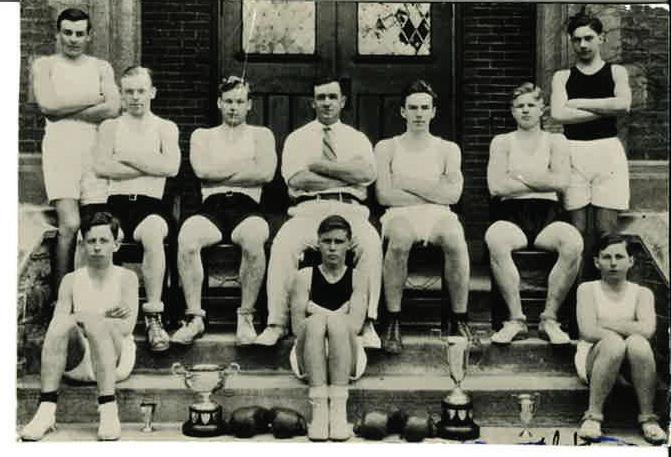
Between 1889 and 1903, Ridley’s gymnasium was located in the laundry room of the Springbank health resort, the school’s original site. Dismayed by the initial lack of equipment for physical training, the indefatigable Dr. J.O. Miller fought painstakingly to equip the space with “tumbling mats, horses, parallel and swinging bars and rings, enough dumbbells for class exercise, and many other things, thereby sending a message to the Board of Directors that “when the Headmaster wanted something he considered an obligation, he had a tenacity that was easier to appease than oppose.”
Following the relocation of the campus on the opposite side of the 12 Mile Creek, a campaign was organized by a group of Old Boys, led by A.W. Taylor ’90, to build a proper gymnasium, as inadequate space proved a barrier to indoor activities at the time, especially during the winter months. By April 1910, the new facility was completed, an event which, if only temporarily, signalled the completion of the impressive new Ridley complex on new grounds. The new gymnasium inspired an explosion of physical activity on campus. In particular, this era saw a massive expansion of basketball—the novel “sport of the century”—as well as the introduction of gymnastics, and regular instruction in boxing.
By 1935, however, Headmaster, Dr. H.C. Griffith recognized that the Old Boys’ gymnasium had become woefully inadequate — “the upper walls have started to spread … and the swimming tank will not hold water.” Shortly after this
proclamation, attuned to the decay that threatened Ridley’s world-class athletics, he took decisive action and construction began on a new facility that would be suited to the needs of the time. Designed by the architectural firm of Old Boy, Ferdie Marani ’12, this new three-level structure would be erected on the site of the former gymnasium and would accommodate a vast spectrum of activities—both athletic and dramatic.
On November 4, 1939, the new facility opened its doors. The opening ceremonies were beholden by hundreds of spectators, including the Upper Canada College football team who presented the school with a magnificent silver bowl to mark the occasion. It would eventually come to be named for the Iggulden family. Much like the Old Boys gymnasium, the towering presence of the new complex — and the possibilities it represented — had a revitalizing effect on sport at the school once more, enriching its spectacular athletic offerings beyond the “traditional trio” of football, hockey and cricket. Here, young Ridleians could engage in a range of pursuits, including swimming, squash, basketball, gymnastics, shooting, fencing, and, of course, boxing.

In the 1930s, boxing was the second most popular sport after baseball in the United States. In striking contrast to our southern neighbours, boxing was regulated provincially in Canada, with many jurisdictions moving to outlaw the sport for its brutality in the early “bare-knuckle” days.
However, illegal bouts often took place in remote areas. As time passed, the sport began to gain respectability near the end of the 19th century, particularly in the Maritimes. It makes sense, then, that this region would produce a number of future national and international champions, including Sam Langford and George Dixon.
It would be erroneous to claim that the construction of the gymnasium sparked a revival in boxing at Ridley; its stature had been steadily rising in popularity among Ridleians
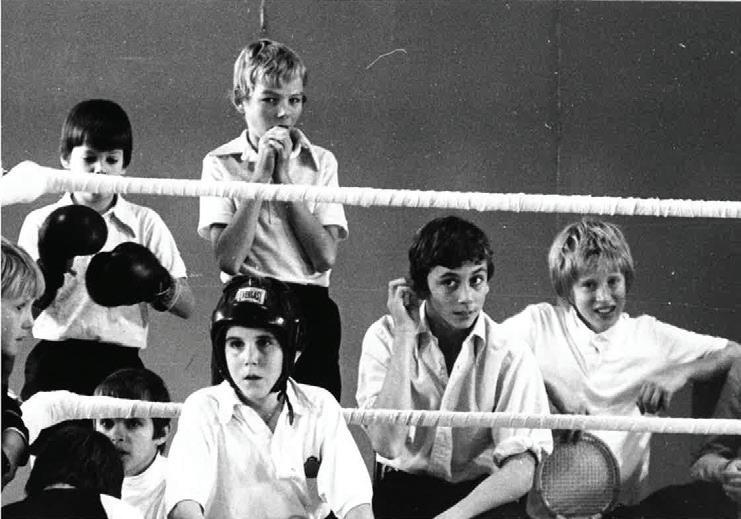
for years. As early as 1909, bouts were staged in the “roofless rink” at the former Nicholls Hall, named as such because its covering had been obliterated by the St. Catharines cyclone of 1909. But it was not until 1922 that the sport became a staple of athletic life at the school. That year, the programme saw two major developments—boxing was made compulsory for all Lower School students, a feat which required the engagement of an experienced boxing coach to support this considerable expansion.

Prior to his tenure at Ridley, Sergeant Alec Alexander had enjoyed a brief reign as middleweight champion of the Canadian Expeditionary Force. Joining the ranks at Ridley in 1922, he worked tirelessly in service of the school and moulding the next generation of Ridleians into thoughtful, disciplined young men prepared for the world and future leadership, doubling by day as the school’s carpenter.
Far from sculpting children into prizefighters, the programme under Sgt. Alexander sought merely to teach moderation, confidence and self-control—to work on character rather than physical stature. The rationale for making the sport mandatory only for Lower School students was to help students develop these skills and reflexes while their weights—and as a result, their punches—were still light. As Kim Beattie reflects, under his tutelage, these enthusiastic young pugilists
“…learned to give and take, to control their tempers, to fight back under fire. There was probably not a small boy who did not gain in control of anger, fostering of courage, in self-confidence, muscle coordination, sharpened reflexes.”
Furthermore, this compulsory participation was proven quite flexible under pressure. Many students were excused from activity by the wishes of their parents or the decree of the school doctor.
In actuality, the actual boxing knowledge endowed to students was negligible. The sheer number of participants made
individual coaching impossible. However, the most promising students blossomed into exceptionally proficient fighters, honing and refining their skills in the ring during the school’s annual tournaments.
Two major donations in the early stages of the programme were instrumental to its future success. The first was a large crate of boxing gloves in all sizes gifted by Old Boy, Charlie “C.O.” Fairbank of Petrolia. With a new ring constructed and all necessary equipment on hand, the school was now primed for the second: a collection of prize shields, from Old Boy, W. Robertson of Toronto, to be presented to the champions at the school’s inaugural “boxing night” tournament. After a series of three-minute bouts, these prizes were distributed to the following students by the Mayor of St. Catharines: Midget Class (95 lb) – Waters beat Dodge Fly Weight (105 lb) – Smith ma beat Jones Bantam Weight (115 lb) – Docherty beat Cronyn Feather Weight (125 lb) – Pirie beat Breckenridge Light Weight (135 lb) – Welch beat Hartt Middle Weight (158 lb) – Bright mi beat Gordon Light Heavy (over 160 lb) – Bright ma beat Mackenzie
This decade also saw a number of fierce rivalries emerge. One of the fiercest and most entertaining was between J.D. Buchanan and J. McCallum. The two Upper School students met in the ring for the first time in 1923, with the latter defeating the former in the finals that year. In 1924, the duo traded barbs once more, but this time, Buchanan gained the upper hand on McCallum and swiftly defeated him. The next year, McCallum had graduated, but Buchanan, with some residual fire burning in his heart, emerged victorious once more, besting his opponent with a right hook to win the tournament by technical knockout.

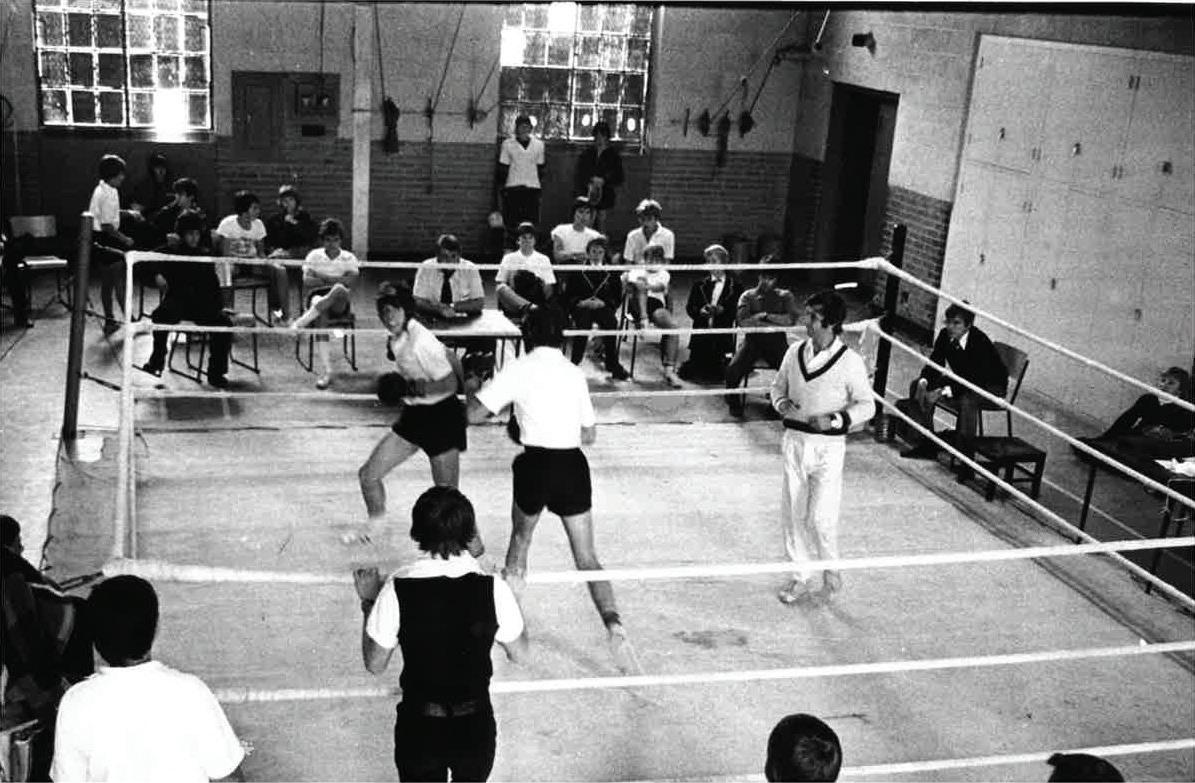
By the 1940s, the number of volunteer boxers from the Upper School had reached a new high, causing an aging Sgt. Alexander to recruit extra help to carry out training. Between

1939 and 1944, the number of students vying for a spot in the finals at various school weights jumped from 40 to 94. As a result, while students previously had ample time to prove themselves, Sgt. Alexander was forced to start eliminating boys after their first serious appearance in the ring. By the end of the decade, Bradley and Lewis recall, the basement of the gymnasium was “fitted with a regulation ring, punching bags, skipping ropes, a first-aid kit, and at least thirty sets of big boxing gloves,” with athletes spanning a modest 95 pounds to 175 pounds plus — the school heavyweights.
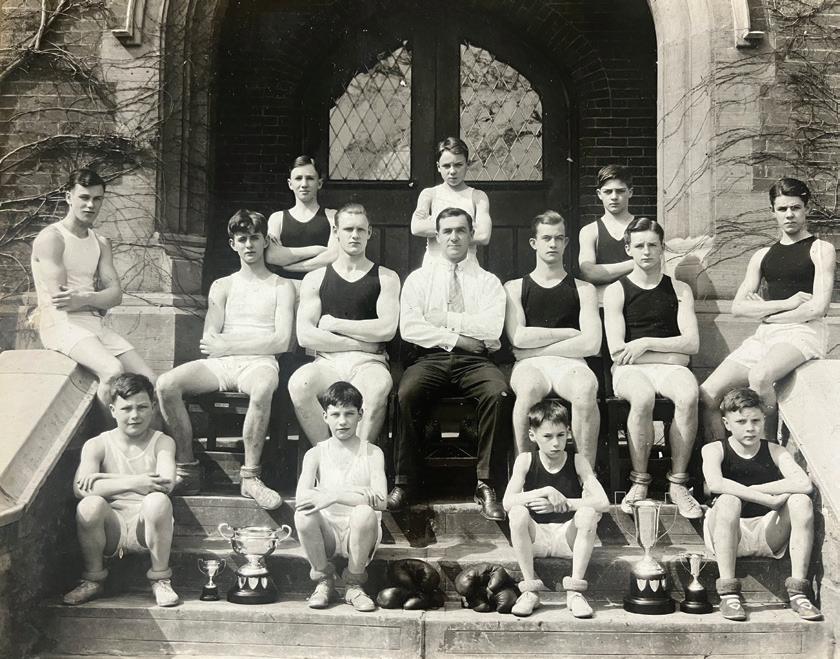
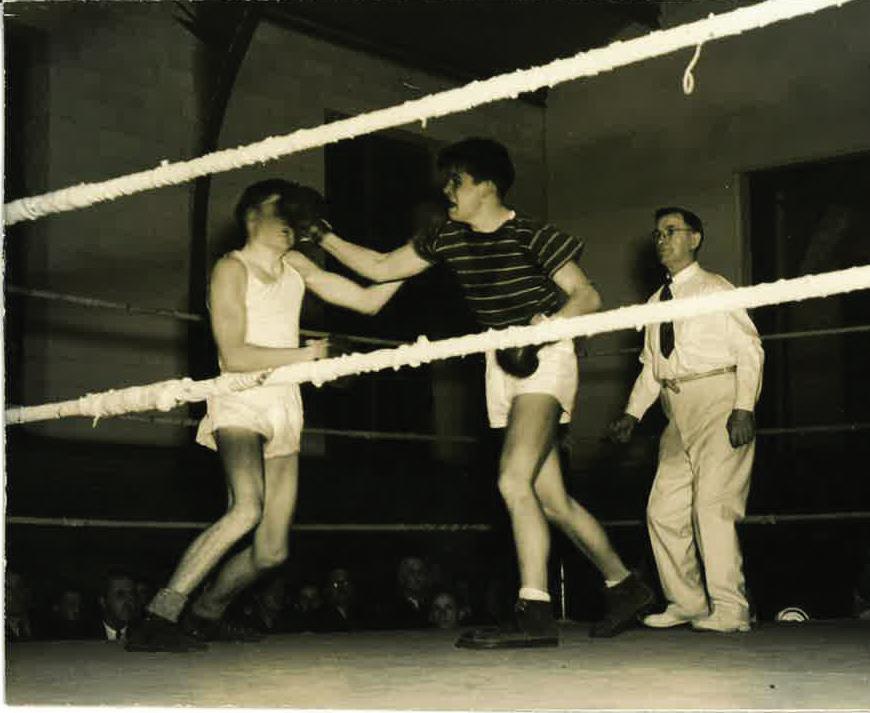
By 1947, the annual boxing tournament had grown significantly in stature and reputation. It was this landmark year that Hap Day and the Toronto Maple Leafs made the trek south to observe the spectacular series of bouts on offer. That same year, after 25 years of service to the school, Sgt. Alexander retired. His duties were promptly resumed by Mr. Cecil Rhodes, with the help of former Ontario light heavyweight champion, Stan Duke. Losing no momentum, the programme under Rhodes and Duke was forced to lower the weight classes in the semifinals and finals to 55 lbs. in 1949 to meet Lower School demand.
In the 1961-62 school year, Sgt. Alexander returned briefly as an assistant coach, and despite an increase in other winter athletic offerings, the programme remained relatively consistent for the next decade. During these years, fine young fighters competed tirelessly, with the best of the bunch collecting the programme’s coveted special awards. The Best Senior Boxer was awarded the Maclachlan Trophy, while the Best Junior Boxer was presented the R.P. Tidy Memorial Trophy. There was even a prize for the Best Loser—the student who showed the most promise despite not scoring a technical win. This boy walked away with the Hilton Trophy. In 1976, two additional runner-up awards were introduced—one awarded to the second-best senior student, and one awarded to the second-best junior.
The 1970s saw both an expansion and a contraction in the boxing programme. As mentioned above, there was an expansion in the number of prizes conferred, but there was also simultaneously a decline in student interest in the sport. By the early 1980s, the programme had unfortunately become a victim of the times, ending not with a bang but a whimper in 1983, ironically, at a moment when the sport was captivating global audiences in films like Rocky and Raging Bull. Remarking on its unceremonious departure, The Reverend Donald P. Hunt, Headmaster of the Lower School at the time, commented:
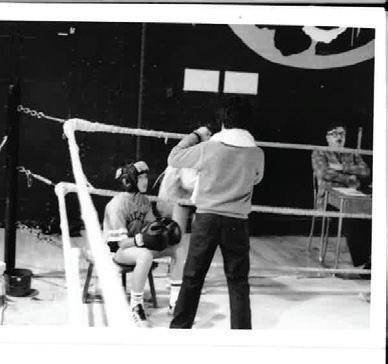
“We decided that the boys were really learning very little of boxing, that the risk, although minimal, was still there and nobody was prepared to suggest boxing as an alternative sport—so it simply disappeared … [and] no boy asked me where the program[me] went.”
As such, the winners from the November 1982 tournament—Bill Sosa, Gerardo Soto, Jeff Murray, Chris Stevens, and Santiago Zavala—carry the distinction of being the last.
Perhaps boxing was fated to disappear. At the same time, its disappearance coincided with the institution of new traditions and activities more suited to the times. The programme will forever live on in the memory of those who participated, those who sat ringside and felt the energy and tremendous affection in the room, in the Ridley archives, and in the foundation of the Iggulden Building itself. To those holding onto these memories, we encourage you to share them—with family, with friends and with us! We look forward to hearing them.
Local AM and PM bus transportation for eligible day students starting September 2023. Learn more at ridleycollege.com.

Addressing the future needs of our students and campus


Support our history of tradition and excellence. Donate to our campaign to grow our endowment and help build state of the art facilities.
